#It's such a nuanced take on revenge stories that show more humanity than many other ~heroic~ narratives I've seen
Explore tagged Tumblr posts
Text
One underrated aspect of svsss is the meta that for the reader, a tale of karmic justice and revenge is satisfying. When you're suddenly a participant, it's much scarier. But then it goes a step further to showcase that ultimately, no matter how many of his bullies he slaughtered and no matter how much he made his abuser suffer, the protagonist was never able to fill the void of the love he needed.
And in svsss, Bingmei DOES know he needs that love! He experienced that love and then lost it! And trying to regain it was so much more important to him than repaying Shen Qingqiu for being wronged! Even though he was still so justifiably angry! Without love, the truth cannot be seen!!!
#It's such a nuanced take on revenge stories that show more humanity than many other ~heroic~ narratives I've seen#It doesn't dismiss Binghe's hurt or anger#It's instead about how Shen Qingqiu needs to offer the one he hurt more understanding and compassion#It's just...so great agh#Love this devastating book that taught me like ten different euphemisms for fucking in one paragraph#Magi Blah#meta#scum villain's self saving system#svsss
28 notes
·
View notes
Note
Haha despite not having posted in 10 years, my blog shows my teenage angsty self so perfectly i will never delete it :) I have a question if its alright, one of the things I love is the way you've written the relationship between Rosalie and Jasper. I always felt they must be close and Rosalie wouldn't share her human last name with him if they weren't. However they both had a very different violent past and i imagine it being difficult at the beginning. How do you think they bonded?
THE PERFECT TIME CAPSULE BLOG I love to see it thank you for preserving such vital history 🤝
I'm so happy you asked this because I answered this pretty thoroughly a few months ago here in this ask. but I love that you ask it in reference to their starkly "different violent" pasts, because like yes!!!!! they're on opposite ends of the spectrum there! sure they both have 'fucked up' backstories, but in this case Pretzels is Not The Same and I looooove zeroing in on this to add another layer of "rosalie was definitely not okay with their arrival NOR SHOULD SHE HAVE BEEN! *gestures to jasper's Everything*"
rosalie was a victim of a horrific crime who was changed via carlisle to save her life. jasper was very much not a victim at the time that maria found him and was changed as a form of recruitment for a very different army in a very different war. now of course there are arguments to be made about jasper being a victim in this circumstance, and while there is nuance to it (after all, what would drive a 16 year old to run away from home in the 1860s to join a brutal, deadly war that they'd probably end up dying in if they stuck with it?) I typically have to disagree when people like to try and pass jasper off as this innocent little baby Who Knew Nothing Better 🙄. but I digress, this isn't about jasper. this is about rosalie's and jasper's contrasting starts to immortality which I find so interesting
I love rosalie and jasper's relationship for sooo many reasons and this completely different start to 'life' is a big one! rosalie was a victim of intimate partner violence who was changed into a superpowered bloodthirsty immortal vampire. after this she sought revenge, killed her killers but did it without spilling their blood, reclaiming some measure of power despite now existing in this life she never wanted and pretty goddamn miserable because of it. jasper was a perpetrator of violence even before he gained immortality (even without "seeing any real battle" or whatever bs line they gave him in the movie) which only escalated when maria found him and he was gifted with his own superpowered bloodthirsty vampirism. then, surprise! his has an extra superpower! which helps him to control this army and continue this cycle of violence, but slowly it begins to wear on his mental state until this "monster of the grisliest kind" becomes a depressed meandering nomad destined for suicide if we're being real here
again, I won't get into it too far or this answer could be another 1k+ words long, but even in eclipse, jasper doesn't try to dodge responsibility or moralize when he's telling bella his story, he just tells it as it is. (which I've said before but I adore as a character choice. it makes him so much less bastard-man-coded than edward because of it. and thank GOD 💀) but I find it so so so interesting that the two cullens (hales) that bella has less of a grip on are the ones who come from such violent backgrounds! but! on different ends!! of this spectrum of violence!!! it makes it that much more meaningful to me when you see them take each other's sides in midnight sun, as they seem to acknowledge that if someone's gotta make the tough choices, it'll be them 🤩 ugh I just love them so much, yknow?
8 notes
·
View notes
Text
I'm going to go roll the rock away from Nacho's tomb in a minute to see if he's better yet, but before I do, I feel like talking about why we got Nacho Christ in the first place.
Both BrBa and BCS are heavily thematic. They have a point beyond things just happening. BrBa is about toxic masculinity and its life-destroying effects. Walt insists over and over that he turned to crime for the sake of his family, but in the final episode, he confesses to Skyler that he did it for himself. He “protected” and “provided” for his family not for their sake, but in order to feel powerful. That quest for power destroys Walt, his family, Jesse, and a shit-ton of other people, from the addicts he supplied with dangerous drugs to the people he killed (both on purpose and by accident). Toxic masculinity, says Vince Gilligan, is bad.
So what is BCS trying to say? I don’t think the premise is as explicit as BrBa, partly because I’m pretty sure they didn’t start the series with this intention. But as they found their identity, it slowly started to take shape. BCS is about the folly of vengeance.
BCS 6x09 is in many ways the real finale of BCS—the end of Jimmy’s pre-Saul life. And just like BrBa made its premise explicit in its finale, BCS has the characters reference its theme directly, too. When Mike promises Manuel justice for Nacho, Manuel looks at him in disgust and tells him, “What you talk about is not justice. What you talk of is revenge.” The next scene finds Gus trying to make a human connection before realizing that his quest for revenge endangers anyone close to him, and he will lose them just like he lost Max. His life will always be empty of love and companionship. And Jimmy and Kim have lost each other, their lives and marriage torn apart, all because they wanted to get back at Howard. Revenge, says Peter Gould, is bad.
(courtesy cut for the tl;dr)
There were a lot of things that sent Jimmy down the slippery slope into becoming Saul, but two acts in particular turbo-charged his downfall. Even after Jimmy defeats Chuck’s attempt to kick him out of the law, he’s still angry. Humiliating Chuck at the hearing was a means to an end, but manipulating the insurance agent to hike HHM’s rates was pure vengeance, done solely to hurt Chuck. That action indirectly leads not only to Chuck’s suicide, but also to their final conversation when Chuck advises him to let go of his guilt and accept that he’s a bad person deep down inside and will never be anything else.
Jimmy’s big second act of vengeance is against Howard, which ends with him losing the love of his life. And once Kim leaves, Jimmy embraces the worst parts of himself, which leads to him enabling Walt’s reign of terror. Revenge has poisoned his life.
Mike’s story also illustrates the anti-vengeance theme. Before the show even begins, Mike had taken his revenge by murdering his sons’ killers. It made him feel better temporarily, but ultimately it did not give him peace. Instead, he chases more vengeance, against Hector this time, which ultimately leads to his downfall.
Even Chuck’s story ties in with revenge. Chuck wanted to punish Jimmy—for stealing from their parents, but also for being more loved than him (in his warped perception). This obsession with taking down Jimmy leads to his disgrace and death.
So what does this have to do with Nacho Christ? A lot, because Christ symbolism is often used around themes of forgiveness—the opposite of revenge. But BCS has a more nuanced point of view than turn the other cheek. BCS’s Christ figure dies cursing the people who wronged him. Clearly the point isn’t that Nacho should have forgiven Gus, or Gus should have forgiven Hector, or Mike should have forgiven his son’s murderers.
Instead, BCS says the alternative to revenge is to forgive yourself. But forgiving yourself is not an easy action, because to truly be at peace, you have to make amends where you can. Nacho’s crimes put his father’s life in danger. He made amends by sacrificing his life to save his father. Jimmy makes amends by publicly admitting to his lies and telling the truth at last, which leads to the loss of his freedom.
An important point is that neither Jimmy nor Nacho made their sacrifices just to punish themselves. Self-punishment does not lead to forgiveness, although the price of truly being able to forgive yourself is sometimes steep.
Nacho was backed into a corner. He could have instead gone down the path of revenge by letting Gus kill his dad and then swearing vengeance on Gus. But that would have been pointless and not given him any relief from his guilt. Instead, he chose to sacrifice his life in order to get his dad out of the danger his action put him in. Nacho’s death wasn’t a punishment—it was just the natural outcome of the action he had to take to make amends.
Likewise, Jimmy going to prison wasn’t the point. In order to be an honest person, Jimmy had to start telling the truth, not just to himself but to the rest of the world. A consequence of telling that truth was prison time.
The show goes out of its way to demonstrate that point with Kim’s story. Her Floridian exile is a punishment she concocted for herself, thinking that suffering would make her feel less guilty. But it doesn’t. Inflicting pain on herself does nothing to make up for what she did to Howard.
In order to forgive herself, Kim must make amends. What does finally help is confessing to Cheryl in order to help restore Howard’s reputation. The consequence of her confession is that she’s put herself in legal jeopardy, but that isn’t the point. The point is she's doing what she can to make up for her actions, which allows her space to forgive herself.
At the same time, self-forgiveness doesn’t always involve a high cost. Mike’s path to self-forgiveness was to be a supportive presence in Kaylee and Stacey's lives—to take on the role Matty would have played if he had lived. He didn't need to buy them a house with dirty money. He just needed to be there. But ultimately, facing his demons and taking on the hard work of processing his grief was too painful for Mike. Instead, he took refuge in revenge and became even more lost.
So that's why we needed Nacho Christ. He is the negation of the cycle of vengeance.
110 notes
·
View notes
Note
Questions for you about vampire laws in your universe!
-I assume thralls can be stolen by simply throwing them over your shoulder and running away. What's the penalty for stealing a thrall? Does it depend on the thrall's quality/type? What about a penalty for simply injuring a thrall, or drinking from them without permission?
-Are there any legal limits on vampire treatment of thralls, or can they do whatever they want including unnecessary torture and killing?
-What are the restrictions on creating new vampires? What other laws apply to them that aren't applicable to humans, like letting people see them drinking?
-For crimes that can involve human police, like stealing, do the vampires let the human justice system handle that? What's the justice system for crimes that human police can't handle? Are there vampire cops, courts, prisons?
I am on a plane and bored, expect more asks with a million questions, please don't feel pressured to answer any of them.
Great questions! I'm playing fast and loose with a lot of the worldbuilding in this story, but hopefully I can provide some insight into what I'm thinking here!
Laws in vampire society are probably more similar to rules in organized crime situations than the human justice situation. There are a small number of vampire arbiters in any populated area who are expected to remain neutral and who can be called on to settle disputes in a matter other than force. Going against the judgement of an arbiter, or attacking the arbiter themselves, is strictly forbidden and likely to result in retaliation from other vampires. That being said, it's also common to handle disputes simply through revenge, violence, shows of power, and forcing other vampires into submission.
So when I refer to things being legal or illegal in vampire society, it's generally the set of rules agreed upon by most vampires and arbiters, not something codified into law the way humans might. There are books written on vampire law, but these only exist to describe common practice.
Stealing, injuring, or drinking from another vampire's thrall without permission is one of the fundamentals of vampire law basically anywhere in the world. Vampires are innately possessive of their thralls, even those who hold humans in contempt, and do not suffer this injustice lightly. In particular, drinking from a thrall without permission is considered the height of disrespect towards the vampire who owns the thrall.
Depending on the arbiter, these crimes could be punishable by monetary fines, allowing the wronged vampire to take or drink from a thrall owned by the offender, or even torture or death. Monetary fines would generally be based on a fair market value for the thrall plus additional fees for the defilement. This is also one of those crimes that a lot of vampires would choose to solve with revenge.
(It's also generally considered bad form to attack a vampire's thralls needlessly, even if you're carrying out revenge against the vampire. Leaving them unharmed and claiming them as your own is more acceptable.)
There are no legal limits about how vampires can treat the thralls they own, including torture and death. Probably the biggest divisive issue in vampire society is how humans should be treated -- there's a lot of nuance among individual views, but the broad camps are "humans should be treated as treasured pets or servants" versus "humans should be treated as mindless livestock."
So there are social consequences to mistreating thralls. Torturing your thralls and acting as a sadistic monster will ostracize a vampire from the majority of vampire society, except for those who approve of this sort of behavior. And even among those who see humans as livestock, killing for no reason is seen as a waste and a failure of self-control.
There are no laws around creation of new vampires. Generally speaking, it's frowned upon to sire many vampires, as more vampires equals more competition for limited resources. Vampires are subservient to their sires, so a vampire who sires more than a handful of new vampires is going to be looked at with suspicion and possibly cut down before they can amass a small army.
While there are no laws per se, it is extremely taboo to sire a human who has not yet reached full adulthood.
For crimes that can involve human police, vampires generally prefer to settle them among themselves using arbiters. In most major cities, there are vampires on the police force, but they're mostly invested in keeping the masquerade going and making sure vampire society remains hidden from hunters. It's considered shameful for a vampire to get arrested and put on trial by humans.
20 notes
·
View notes
Text
I guess this painful small detail I love about V8, which I have remarked upon a few times, is the gesture of compassion Winter extends to I/ronwood - maybe thinking about her because of a post I wrote the other day - appealing to his better instinct... she still loves him very much, this sad almost-father of hers, still believes in him, uses the opportunity right before she betrays him, uses that trust he extends in her unilaterally, more than anyone else, to still be kind, maybe purposelessly - except for herself, except for the affirmation of this kind-strange-blooming hope in her.
Emerald snaps out of it when she sees what Salem is doing to Cinder - that we've clearly been show is what she was initiated into, as a little girl - and it's this moment of recongition and compassion that is, again, rewarded. It's a tender recognition of pain, that Emerald is to Cinder what Cinder is to Salem, that Cinder plays at being Salem in imitative girlishness, which is not to say just master, but mother, and yet Cinder is more of a peer than an authority, pretending at the latter, denying she's the former. And Salem is a complicated surrogate mother. She killed her last daughters. And yet to Cinder, the arrangement is clearly better, which is exactly how she would intellectualise her arrangement with Emerald. Mercury's mercenary, known all along what it was, because he knows how parents hurt, but Emerald was just an orphan girl in need of love at any cost, as orphan girls are in this mocking fairytale. And there's still allowed to be a tenderness. There's a tenderness for Winter, and a tenderness for Emerald, even amidst the pain, of realising who I/ronwood and Cinder really were.
I really thought that that sort of complexity wouldn't be in the story and just take the cheap way out, that people who are hurt immediately stop loving the people who hurt them because that's just how it should work otherwise you're complicit in your own pain, especially after so much discourse surrounding Adam. But even the treatment of Adam is really weirdly tender... Blake gives him so many chances to go, and he keeps chasing her, fixated on a shadow. I don't find revenge fantasies cathartic for their own ends, the simple, breezy archetype of how abuse is supposed to function: the victim hates the person who hurt them and the hurt happens removed from the breadth of human experience. The Abuser is not a malignant, external, compartmentalised entity so cleanly cleaved from A Community, more wandering Devil than human; the abuser is a man, and a woman, who do bad things, who walk amongst us in plain clothes. Violence is a choice made, and made every time. Adam is symbolically the wilting rose curse, but he is also a person, and maybe that's where the R/WBY thesis about fairytales-being-real works here against allegory so successfully: he is literally a pained man (his full name means first man-bull, from the earth), a pained Faunus, who crafts for himself a match from his rib. But that's not who Blake is, and Blake has to be a real person too, and so does he, outside the story bounds.
But Winter is also funny because she takes a last final snipe against her father (whom Weiss also extends a mercy to)... because to her, I/ronwood is the better daddy, will always be the better daddy, still saved her and saved Weiss, even though he betrayed her in the end. That there's still room for that after everything is... a really rare type of nuance. And maybe at a character-level, that's how I feel about I/ronwood; it's hard not to love him, and you can countenance that with what he is, what he becomes. Like, I did not expect this level of compassion for the experience of the suffering characters at all.
Yet there's a strange reversal of this sentiment in Rhodes' final head-caress of Cinder when she strikes him down. It always read as so condescending to me: he's told her that she'll run all of her life, and now, even as he dies, he's not let her forget what he was to her. It's supposed to be like forgiveness, and yet to me, he's the one who should be begging for forgiveness. It's a tenderness which wrecks her. Even the one who might have protected her didn't. There's a warped mirror between Rhodes and I/ronwood here, too: I/ronwood would sacrifice Winter into the gullet of Salem, and she has to swallow it down, knowing that she can't really be his daughter, but in a weird way, that's how he shows his love and what really is his familial and intense affection for her. Whom else would I/ronwood trust with the gravity of such an act? This is the path that Rhodes wanted for Cinder, and yet it seems like neither of them ended up truly happy. It took so much longer for Winter to figure out what I/ronwood was than Cinder did Rhodes, and these are the Maidens we're left with.
Salem tortures Cinder and then raises her up, structurally in the story, and then atomically, this is the pattern of their dynamic: fear and strength, fear and power. I really wish I had a .gif here to convey it, but the movement from her knees to this always struck me, taking Salem's offered hand... I don't know, this is the world to her, and the world crafted through pain, her body grafted with it, scars incised, and there's this appreciation what effectively looks like dissociation, watching the world through the eyes of the dead -
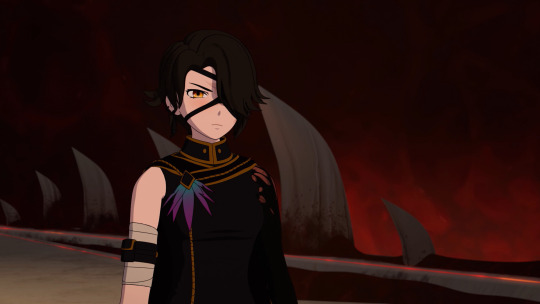
contrast with when Winter's magic shocks Cinder (off in the distance, like a blue ghost, more revenant than fairy), a forcible intrusive remembrance of the connection she tries so hard to deny.
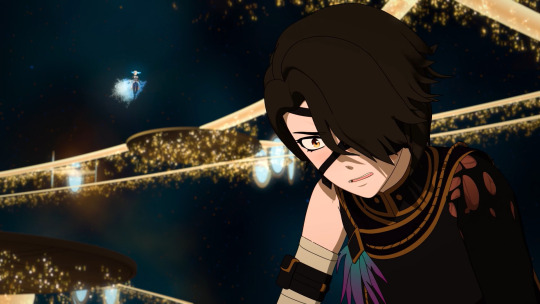
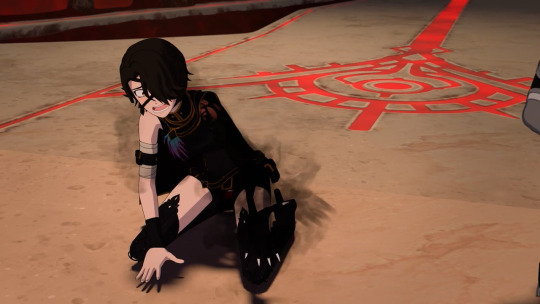
Salem does to Cinder what was done to Salem. Endless, eternal torture, this sharing of horror, the worst sort of forced empathy. But Cinder exults when she feels Salem again through the arm, after Salem temporarily dispersed into the aether. She's a source of safety and harm at once. She's a nurturer who feeds her poison. Salem gets to re-enact the mother-daughter relationship she squandered, through this Four Maiden vessel all of her own, the girls who were like daughter surrogates to Ozma too.
And you can see this over and over in the story. These aren't outliers. The Yang-Raven relationship, mired in cruelty and neglect and abandonment, and care, magical voyeurism - watching her child grow up through the eyes of a bird, feeling a magical connection, forever bound to protect - never once is Yang punished for her anger, but neither is she punished for longing to find her mother either, and both are allowed to exist. And Raven loves her, and also hurts her, and also talks down to her, and then there's the strangeness of her grown daughter rising to the challenge she set and going above and beyond - growing beyond her - in the Ozlem conflict. This thing she denied herself because of it. It's all really complicated. Then once you get to the throughline of Ruby and Summer - the background pressure-cooker mounting and mounting - the heroic image broken down and made into a Grimm monster - you have what is the thread of our head protagonist, allowed to grow, and burst open. It doesn't victim-blame, it doesn't fall prey to so many bad stereotypes about the way abuse is "supposed" to work, the way abuse is reconstituted to fit social sensibilities, to fit consensus reality; it is just allowed to be experienced by the characters, for the story to evolve. Maybe they find healing and reconciliation, or forgiveness, or protection, or do what they must, the violence still marking them. Killing Adam doesn't come without pain. That the hurt and the abused - like Cinder - are forced into acts of violence is itself a betrayal too.
It gives me hope that it would be possible for an Ozlem resolution to be nuanced like all of this too. Ozma wants to preserve the memory of Lionheart - a good man, never a coward - and I think this kind of speaks to how he views his whole deal with Salem: people are written into history as ideals, as what they should've been, the matter simplified, Salem bad, the people who work for good, good. I/ronwood's fall complicates this, and makes us empathise with him, but I think challenges this binary too. He's so afraid of them finding out that he loved Salem once, in part, I think, because it disrupts the binary, the rewriting.
It's hard not to, now I've written it out, read it as an intentional thematic idea repeated. It's communicated so blatantly as much through Alyx, that all this can be held in tension, and appreciated, giving catharsis. That there is bad, and good, and bad, and the path to something like healing and resurrection is not binary, that healing is not the binary enforced on you through abuse either - hurt or be hurt -, that you can love and also hurt and still need to leave, that violence is not forever, that it is not right that a victim may be forced into a protective violence, that violence is not just bad because the wrong people do it, that moments of marked violence do not define anybody forever in a story like this, because it is a choice made, and must be made over and over, and could be rejected. A world without redemption is a prison. That's the prison Salem was locked in by the brother gods: to be lessoned by Ozma, to be tortured through eternity into submission. Given the experiences of the cast laid out, one can hardly think that this is the ultimate boon of this story. But then who could forgive the brother gods, too? I suppose their mother.
4 notes
·
View notes
Note
yeah this ^
like weighing in, i personally dont think the httyd books are either at all tbh
as i see it, the fat consul is painted as bad because he's greedy, gluttonous, and cruel, not because of his size. almost ALL of the characters have got some weight on them and it's painted as a good thing, that they're strong, healthy, and well fed. the httyd books shows a ton of large and fat characters in a very positive light. this series put "thunderous thighs" in my vernacular.
as for alvin, totally agreeing with @reluctantlyanimating here. alvin is NOT the only disabled character and the idea is that he's reaping the consequences of his actions, it's not that losing limbs = bad, it's that getting into risky situations and throwing away your sense of self-preservation because you're bent on killing a preteen = bad.
many other characters are missing limbs and stuff and there's no huge deal made about it because it's normal for them in their line of work. an occupational hazard, you may say. and i have no idea why people make the argument that alvin is the only disabled character because it's just verifiably not the case.
baggybum the beerbelly, snotlout's father is missing an eye

mogadon the meathead, the meathead chief is missing an eye and a leg

one-eye, a sabre-toothed driver dragon with a love for all other dragons has, well, you guessed it, one eye

the windwalker. the purest most loyal hot chocolate smelling riding dragon of hiccup horrrendous haddock the third himself has a likely permanent limp from his manacles

and i cannot CANNOT believe everyone has forgotten about FISHLEGS, practically the SECOND MAIN CHARACTER when citing that alvin is the only disabled character.

fishlegs has his plethora of allergies, poor eyesight, asthma, eczema, knock knees, flat feet, a limp, and probably a few more things i'm forgetting, and if those don't qualify as disabilities i have no idea what should. because from personal experience at least (i don't have exactly his stuff but i have 3 similar things), i think crappy eyesight, horrible skin conditions that make you want to rip off your skin, and foot deformities that make it hard to walk without tripping over your own feet WILL BE DEBILITATING especially with nothing to treat or help like fishlegs. and he as MORE than those three.
and get this. wouldnt ya know it. but he ISN'T painted in a bad light because of his disabilities. none of the characters are, except for alvin. which we've covered is PROBABLY because of the fact that he's DEDICATED HIS LIFE TO OFFING A PRETEEN AND LOST HIS SENSE OF SELF-PRESERVATION WHICH RESULTS IN HIM LOSING HIS LIMBS and not ONLY because he's lost his limbs. the limb loss is a visual consequence of his actions. there's a cause and effect here. it's "chasing revenge -> you get hurt," NOT "no limbs -> you're evil"
idk. like i just feel like the claim that httyd books have these problems isn't very well-founded in my eyes, and it doesn't really examine the actual nuance of the story. because i feel like in every instance, the reasoning behind their villainy is because of their actions, not their physical characteristics. not only am i pretty sure that was not the original intention, but that also shouldn't be the message people are getting if they actually examined the other characters with similar physical characteristics
also i personally think there's a difference between a piece of media containing a phobia/ism and having ONE villainous character who has those traits. like one is a deep set issue throughout where the themes promote those bad things, while the other is just part of the expansive human experience. anyone can be bad. but anyone can be good, too.
but that's just my opinion so take it with a grain of salt i suppose haha
be warned of the fatphobia and ableism in the httyd books i dont think you shouldn’t read them I personally love them despite it but you should at least be able to brace yourself for it
The books are what now?
Is this real, or am I getting trolled again by anons?
104 notes
·
View notes
Note
Ed is my favorite character but I am also very much an Izzy Hands enjoyer and I am baffled by the "Ed is a innocent lamb uwu everything bad and mean about Blackbeard was Izzy but also Izzy is incompetent and Ed never needed him for Blackbeard at all!" sentiment I see. Like....? How do you reconcile that? Also Ed "doesn't kill" but we see him order a man to be flayed alive with a snail fork and then thrown overboard. We see that. Izzy isn't there. Izzy didn't "make" him do this, just like Izzy didn't make him cut off his toe, which happened hours after their fight, in a calculated response that took into account Stede specifically recoiling from the idea (there's something to unpack).
When they say Ed had people kill their pets, Ed doesn't deny it or in any way indicate it wasn't his idea. The entire plan of killing Stede and taking his place was Ed's idea, not Izzy's! Ed could have ordered him to stop at any time and he didn't, he didn't even have the stomach to watch Izzy stab Stede (I love the contrast between this and the act of grace moment), and people act like the whole murder thing was entirely Izzy's idea and desire and Ed is just a helpless bystander. Ed is the one in charge except when he can't or won't be, but he still wants things done his way, wants all of the positives and none of the negatives (who can blame him? We all want that. But Ed doesn't seem to recognize that isn't actually possible).
If Izzy is so diametrically opposed to everything Ed is, and just a horrible hateful little man, why has Ed kept him around? Why is he his first mate? Why does he trust him more than anyone else, and let him in more than anyone else, until Stede? Why does their relationship read like they came up together, like they've literally known each other decades, like there is a depth and history and so much nuance to the relationship and yet you have people acting like Izzy is just some guy assigned by the pirate temp agency to Blackbeard shortly before the show starts? That Ed doesn't have the authority to fire?
There's abuse and toxicity coming from both Ed and Izzy in this relationship, and we're seeing it as it crumbles. The fact that it crumbles so painfully and dramatically - along with just every single thing about the way they interact, I feel insane - speaks to there having been a foundation of genuine friendship and partnership and maybe even love through the years (there are so many ways to love, what Ed & Stede have is glorious but just one). They're both in crisis. Izzy is making horrific, hurtful decisions but so is Ed. Ed has been hurt by Izzy's actions but Izzy has been hurt by Ed's as well (I'm not even talking about the toe! I'm talking about the years of relying on Izzy and having him do his dirty work, with very little thanks).
Ed and Stede have protagonist bias working in their favor (see how so many people ignore Stede's casual colorblind racism and that he can only be funding this adventure through exploitation and violence) - they also had some tragic, traumatic back story shown on screen. Izzy didn't - do people think that means he doesn't have one? That he was just born like this, has always been like this for no reason? That isn't how humans work. Real or fictional.
Ed deserves to be happy, it's what I want most. I want him to heal. I want the same for Izzy. They're both struggling and in pain and nothing I've seen from either of them as fictional people in a romcom makes me think they're undeserving or unable to be redeemed.
Anyway I love your Izzy posts. Keep on keeping on. Sending this anon because I don't want my own haters haha.
All of this, anon. All of this. The Revenge and the rest of the Pirate World are two entirely different stages (up until the end of ep 10), and when they swap between those worlds, the rules shift and change. You go from Pirate Drama (ala Black Sails, for example) to Rom Com and back again. Because of that, pretty much everyone who joined the Revenge who isn't Stede is an objectively awful person in their own ways who have made their lives by killing, plundering, looting, even torturing. I think that's why I love them all so much, because they're being given the chance to evolve past that. It's almost like starting a series with an entire cast of villains heading for redemption. It's excellent.
If Izzy is so diametrically opposed to everything Ed is, and just a horrible hateful little man, why has Ed kept him around? Why is he his first mate? Why does he trust him more than anyone else, and let him in more than anyone else, until Stede? Why does their relationship read like they came up together, like they've literally known each other decades, like there is a depth and history and so much nuance to the relationship and yet you have people acting like Izzy is just some guy assigned by the pirate temp agency to Blackbeard shortly before the show starts? That Ed doesn't have the authority to fire?
omg anon this bit here i was nodding along ready to contribute my own thoughts and then i hit PIRATE TEMP AGENCY and i fuckin LOST IT. thank you for that.
But also I think one particular bit really stands out to me from the POV of their friendship. Two, actually, one less than the other so I'll start there:
the first one is that Izzy specifically sends Calico Jack after Ed. He knows enough about Ed's temperament, and about his relationship with Jack to know that Jack is absolutely perfect to drive a wedge not only between Ed and Stede but between Ed and everyone on the crew. And he DOES. It's an absolutely FLAWLESS plan up until the point they're in dinghy and Jack has to be a bitch and talk about Izzy. If he hadn't done that? If his jealousy, ego, bitchiness hadn't come out so strongly? Damn. That plan was flawless and Ed would firstly have never known about the English and secondly gone back to Izzy.
Because Izzy knew him.
But the bit I specifically wanted to talk about in relation to your piece up there is after Ed hits him at the start of Act of Grace.
First off; Ed only hits him. He socks him real good in the face but that's it! I subconsciously assumed he was testing to see if the English would stop him, and then would surge on with something new but no. He thinks Izzy has completely betrayed them, and he even says so to Stede ("He sold us out.") but all he does is hit him. He doesn't hit him then try to shove him over the side. He doesn't try to bounce him off the mast. He doesn't pull a knife! He just socks him once real good in the face.
And then comes what Izzy says after that:
"That's fair. That's fair. Remember though, you said when you made me first mate, 'above all else is loyalty to your captain'. You're my captain and I was never gonna stand by and let you destroy yourself for that... twat. And this? This is a humane way of ending this. It's quick, it's clean. Edward, you know that."
And oh, my god. I could go on about this line for days but I'll try and keep it brief: Edward is the one that told Izzy that above all is loyalty to him. Edward. Knowing what Ed is capable of, knowing the kind of shit he's done not only in episode 10 but also the skinning and god knows what else? Who knows how he instilled that into Izzy, that his loyalty is to Edward and Edward only. A lot of people think the X on Izzy's cheek is his signature, and fuck. Imagine if that was when he gave him that? Imagine if he literally tattooed his signature into Izzy's face because his loyalty is to Ed and Ed only. (If not that X, perhaps a Blackbeard brand under his glove? Who knows.)
Then, after that, he goes on to say he wasn't going to let Ed destroy himself. This isn't a betrayal, and I think the fact Ed doesn't kill him here, doesn't cast him off the ship at the end of episode 9, doesn't tell him to go fuck himself, proves that Ed doesn't think it's a betrayal either. Regardless of his feelings for Stede, the only time he thought it was a betrayal was when he thought Izzy had handed them all over hook line and sinker with no regards for anything but himself. Izzy did not betray him. Izzy, in fact, kept his pledge of loyalty.
And then finally, the humane way of ending this? Izzy's job is keeping Edward happy. Izzy's job is keeping Edward safe and happy. That's why Stede is, in that scene, about to die by firing squad, not in some gruesome show at Charlestown or whatever else might have come his way. I would lay bets that Stede dying quickly and as painlessly as possible was part of the deal Izzy made.
I would also bet that the words, "This is the humane way of ending this, it's quick, it's clean," was what Edward said about Fang's dog.
They're both in crisis. Izzy is making horrific, hurtful decisions but so is Ed. Ed has been hurt by Izzy's actions but Izzy has been hurt by Ed's as well (I'm not even talking about the toe! I'm talking about the years of relying on Izzy and having him do his dirty work, with very little thanks).
This! This! This! I also want to reiterate very strongly that we never see Edward actually tell Izzy what he wants. He says he wants to retire and he's going to kill Stede and take his place, but when he changes his mind he never actually says, "Izzy, I'mma be honest with you mate, I love Stede and I want you in my life too but I don't want to kill him, and I don't want to be Blackbeard anymore. I want a change." Or whatever way Edward would say those things.
Edward communicates with Izzy zilch, which honestly I think is probably how things have always gone. Edward half kills some guy then goes, "Oh, Izzy?" and walks off and it's up to Izzy to finish it off. One of his crew members does something? He scoffs and scowls and that means Izzy has to handle it. Izzy has had to learn to fill in all those spots that Edward can't or won't, and that's what he's doing throughout the show, but he hasn't yet been told that Edward actively wants these changes.
Hell, I'm willing to say that he thinks Edward is becoming not just something Izzy can't recognize but something Edward actively abhors. You don't tell someone to toughen up and kill their own dog because you like softies. Which begs the question of how much time Edward has spent actively trying to toughen up his crew and remove any soft sides, just to turn entirely into that soft side?
(Also, I'll be honest, I do not think that breakup robe!Edward should be his final form. He was not himself there either, and that's because he's so actively pretending that he's none of the kraken things that he was. He's almost imitating Stede, in a way, trying to hide his pain by being someone else. I imagine his final form will be someone very capable of violence, very capable of anger and being awful, but someone who also has a deeply soft side and cultivates a lot of love and trust from those around him, someone who will murder in defense of his loved ones, rather than just 'cause he can. Which, to me, is who he was when he was younger. He killed his father for hurting his mother, that's made abundantly clear, especially since we never see his father raise a hand against him.)
...they also had some tragic, traumatic back story shown on screen. Izzy didn't - do people think that means he doesn't have one? That he was just born like this, has always been like this for no reason? That isn't how humans work. Real or fictional.
Honestly yeah. I think that's likely what they think.
Which brings me right back to the fact Stede is very much an outlier. Oluwande says himself that him and Jim have no other choice. Do they think Izzy does? Who knows what his past is that led him to piracy, anger and repression at sea? Who knows what makes him so goddamn anxious about everything running Correctly?
And yes, I do read him as anxious. He hates the situation he's in because everything is wrong. Lucius won't do his job, no one does the things they need to do to run a ship, and he is actively seen as a villain in their lives by them when he tries to get them to be the crew of a pirate ship. He nearly got thrown overboard for making them work!
Ed deserves to be happy, it's what I want most. I want him to heal. I want the same for Izzy. They're both struggling and in pain and nothing I've seen from either of them as fictional people in a romcom makes me think they're undeserving or unable to be redeemed.
THIIIIIIIIIIIIIIIIIS!!!!! I want them both to heal, and Stede too!! Stede has so much trauma he hasn't worked through that colors everything he does (as illustrated by the fact this middle-aged man is bogged down and smothered constantly throughout the first few episodes by memories of being what... ten?)
Not to mention that a forced arranged marriage cannot possibly be anything short of traumatic (cultural arranged marriage being very different and depending on the situation etc, I'm not talking about modern arranged marriages, I'm talking specifically about the type Stede and Mary were forced into, and even more specifically their marriage). I don't think either of them were abusive to one another, but being forced to have sex solely by society and those around you to make children? Especially if Stede is gay not bi (which I read him as; gay), that's so... awful? It's basically that both of them had to agree to their own rape, almost? It's a really complicated and horrible thing and god knows what Stede felt after having to do those things with her, especially if he knew she wasn't into it with him either.
Anyway I love your Izzy posts. Keep on keeping on. Sending this anon because I don't want my own haters haha.
Thank you so much for the message because it was GREAT and your own meta was downright excellent. If you ever feel like de-anoning, feel free to DM me! And here, have another Izzy post! lmao hope you enjoy it
157 notes
·
View notes
Text
Spring 2021 anime overview: Quick Takes
Now for my Spring 2021 anime thoughts! I’ve decided from now on if a season’s like, 20- to-24 episodes I’m just going to wait ‘til it’s done to review it unless I feels super passionately, so though I watched To Your Eternity (it’s good!) and MHA (eh), I’ll comment on them next time. Also, for the record, I watched the first eight eps of Joran: Princess and Snow of Blood but I dropped it because it had clearly crossed the line from entertainingly dumb to boring dumb.
I will probably give Supercub and some other stuff a shot later, this was a stacked season! May give updates on all that later, but this is what I have for now.
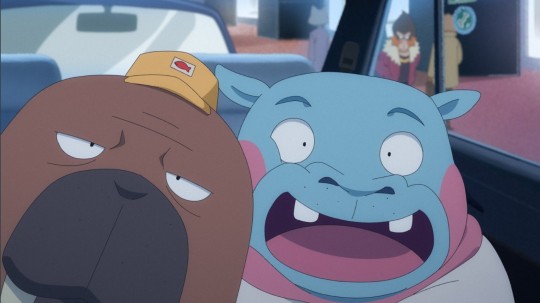
ODDTAXI
Quick Summary: A mild mannered middle-aged walrus taxi driver is drawn into a case involving a missing girl, yakuza, Youtube clout-chasers, manzai comedians and idols with big secrets.
It’s rare to walk away from media and be like “that is a singular experience I will definitely never see repeated again” but ODDTAXI is definitely one of those. A tense noir thriller murder mystery starring cartoon animals that spends an entire episode detailing the one (cat)man’s very fall into darkness triggered by addiction to gacha games and an online auction for a novelty eraser? Also there’s a porcupine Yakuza who speaks entirely in rap? Also there’s tons of meandering conversations about stuff like manzai comedy and the struggle to go viral on Twitter?
Admittedly, I had a hard time getting into the first episode, the dry meandering humor not being enough to hold my attention while I was sitting still, but once I watched this while I was working out at the end of the season, I found it an easy binge. A ton of characters with dark secrets or dangerous ambitions, each with their own part to play in a tableau of intersecting events- and it all actually comes together really well.(As for the female characters, it’s a pretty dude driven story, but they do get nuanced characterization and even some good heroic moments from one of them.)
It’s a great example of a carefully planned narrative paying off, with all the twists appropriately seeded and foreshadowed to reward viewers who paid attention. Even when it ended on a perfect “OH SHIT” moment and denied me closure, I couldn’t help but respect it. If you that all sounds interesting to you, definitely check out the first couple episodes and see if you like it- you���re likely to have a memorable, satisfying experience!
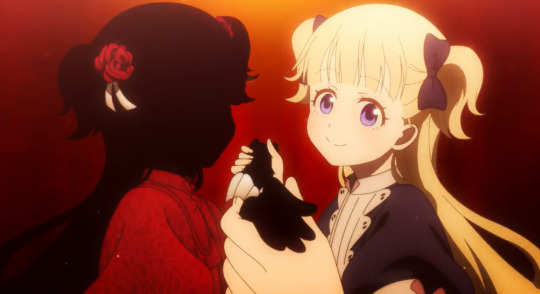
Shadows House
Quick Summary: Emilyko is a ‘living doll’ who’s told she was created to act as the ‘face’ of her shadow master, Kate. The shadows and their ‘dolls’ all reside on the mansion and are required to pass a ‘debut’ to prove they’re a good pairing. If they don’t pass, they might be disposed of. And so the mystery of the Shadow mansion grows...
This slice of gothic intrigue was my favorite of the season, tied with ODDTAXI. With an interesting premise, slightly tense undertones and a strong focus on character building and relationships, it kept me hooked the whole way through. And for any squeamish fans put off by the hype about it, don’t worry, while there are some suspenseful elements, I wouldn’t qualify it as horror. I thought the relationship between Kate and Emilyko might end up being a completely sinister one, but it’s thankfully a lot more complex than that and it’s really interesting to follow how both their characters and relationship grow. The focus of the show is, unsurprisingly, on the “dolls” slowly discovering their autonomy and personhood as they struggle under the rigid system imposed on them by the mysterious elders of this weird Victorian mansion. Can they develop a more equitable relationship with their shadow “masters” (who are also shown to suffer under this system)? There’s a lot to dig into there, and the show has the characters develop through learning to understand and appreciate each other, which is pretty heartwarming. Our hero, Emilyko, is the typical plucky ball of sunshine (they even nickname her sunshine), but she’s also shown to be clever in her own off-the-wall way and she bounces off the far more subdued and cynical Kate well, not to mention the other ‘dolls’ she ends up befriending.
What’s more, the show spends plenty of time to developing several other character pairings and combinations, and they all have their own interesting dynamic that makes you want to see more of them. Same-gender bonds are at the forefront of this show, and many of them are ripe for queer readings (I definitely appreciated the healthy helping of ladies carrying ladies), but even outside that it’s nice to see a show where a strong, complex bond between girls is at the forefront. My only real complaints about the show are the anime original ending is noticeably a bit rushed (though it’s not too bad, and leaves room for a season 2) and I wish the animation used the whole “shadow” theme more strikingly (like the opening and endings do)- instead the colors are a bit washed out which makes the shadows blend into the background sometimes. The “debut” arc also drags a bit in places, but it makes up for it by having a lot of good character integration.
I hope to check out the (full color)! manga soon and see more of this quirky, shadowy story. There’s some physical abuse depicted, sad things happening to characters and naturally the whole “oppressive familial system” thing, but otherwise not much I can think of to warn about. I give this one a big rec, especially If you’re a fan of gothic fairytales and stories of self discovery.
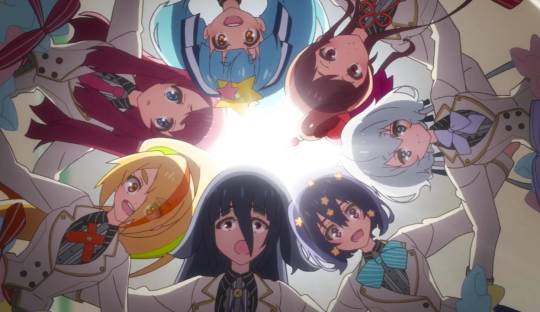
Zombie Land Saga Revenge
Quickest summary: In this sequel season, everyone’s favorite zombie idol group must claw their way back into prominence after a disastrous show- the fate of the Saga prefecture LITERALLY depends on it!
This was a fun follow-up to the first season- if you liked the first zombie-girl romp, you’ll probably enjoy this one. In fact, there were a couple areas it improved on- namely, Kotaro failed, ate crow and embarrassed himself a lot more this season, which made him more likeable (as did the fact the girls gained a lot of independence from him). This season also shed more light on what the ‘goal’ of this zombie raising project is and what kind of shit Kotaro got involved with to make this happen, and it’s appropriately off-the-wall and ridiculous. We finally got some backstory for Yugiri too! I wish it had focused on more of her interiority, but she got to be a badass in it, and it was a treat to see this zombie idol show turn into a period piece for a couple episodes (also her song ruled).
Tae also got a cute focus episode and there was a particular SMASHING performance early on! Also That revelation last season that had the potential to turn creepy hasn’t yet, and hopefully never will. The finale was heartwarming with big hints of more drama to come- I’m definitely down for more zombie hijinks!
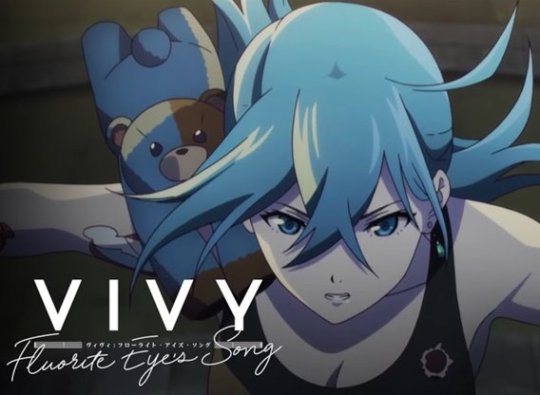
Vivy: Flourite Eye’s Song
Quickest Summary: A songstress AI named DIVA (nicknamed Vivy) is approached by another AI named Matsumoto, who says he’s from the future and they must work together to prevent AI exterminating all of humankind 100 years from now.
This show is absolutely gorgeous visually with some really nice action scenes, but when it comes to the story my feelings basically amount to a shrug. It’s fine! I guess! Vivy starts out as an interesting layered character- and I guess still is by the end- with her stoic but stubborn determination bouncing off her fast-talking bossy partner Matsumoto well. She never listens to him, which is delightful. The way the show took place over the course of 100 years was an interesting conceit as well. However, it bought up a lot of themes and then sort of... dropped them. For instance, Vivy interprets her mission (PRIME DIRECTIVE if you will) as protecting humans at all costs, no matter how destructive said humans are or what their fate is supposed to be, and is perfectly willing to murder her fellow androids to do this, showing she inherently thinks of androids (herself and her own people!) as less worthy. Which is a little alarming! There’s a very dramatic point in the show where they bring this up as a potential conflict for her character but then it’s sort of...dropped. Pretty much.
Actually, despite the premise, the show doesn’t dip into the “AI rights” as much as you think it would with the main theme being more about Vivy’s search to find her own creativity and discover what it means to ‘pour your heart into something’. Vivy herself doesn’t actually care if she has rights or anything. Which is in some ways fine, because ‘AI as an oppressed class’ has been done to death, but IT’S ALSO KIND OF IN THE PREMISE, so that means that the show just shrugs really hard at a lot of the questions it brings up basically just going “humans and AI should work together probably” and that’s it. There’s a lot that feels underexplored. The antagonists in the show also either have motivations that don’t really make sense or have boring hackneyed motivations. In the finale in particular, it feels like a lot of things happen “just because” and it falls a little flat.
I also have to warn that one of the arcs focus on a robot ‘pairing’ where the dude-coded robots actions toward his partner are straight up awful and rob her of her autonomy, but it’s played like a tragic love story. I suppose you could read it differently too, but it definitely made me go ‘ew’ the story seemed to want me to sympathize with this robo dude,
Overall, I wouldn’t anti-recommend this show, it’s an all right little sci-fic romp (and definitely SUPER pretty). My favorite element was definitely the episodes where Vivy develops an entirely new (an loveable) personality, because it played with the idea of of an AI getting “rebooted” really well and interplay between her two “selves” was done really well. But there are a lot of other parts of the show that just feel...a little underexplored and empty, making me have an ‘eh’ feeling on the show overall. It’s definitely an ambitious project, and while it didn’t quite stick the landing, there’s something to be said for a show that shoots for the stars and falls short over a show that just languishes in mediocrity.
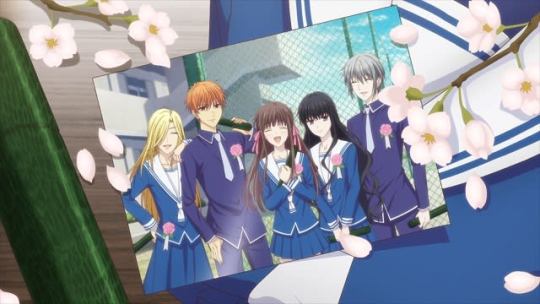
Fruits Basket The Final
Quick summary: The final season of that dramatic drama about that weird family with a zodiac curse and the girl who loves them.
It’s very weird that after not cutting a lot out, they kinda sped through some material for, you know, the finale. I guess they thought they couldn’t stretch this final arc to 26 episodes? Or weren’t cleared for another double cour? However, though there were a couple places that felt awkward, despite being a bit condensed it mostly held together pretty well for a D R A M A T I C and ultimately heartwarming conclusion. I was really disappointed they kept the part where Ritsu cut their hair for the ‘happy ending’, I thought their intro episode not showing them in men’s clothes meant the anime had decided their presentation didn’t need to be “fixed” but WELL I GUESS NOT. That was the only big upset for me though, otherwise the adaptation went about how I expected, sticking to the source material. Furuba has a lot of bumps, from weird age gap stuff to ...gender, but it also has a lot of important feels and great character arcs. It was a gateway shoujo for many and has its important place in animanga history, so I’m glad it finally got a shiny, full adaptation.
#anime overview#spring 2021 anime#shadows house#oddtaxi#zombie land saga#fruits basket#vivy: fluorite eye's song#zombie land saga revenge#fruits basket the final#anime#my reviews#long post
68 notes
·
View notes
Text
Reaction to The Devil Judge (spoilers for ep. 9 & 10)
It’s been a while since i’ve last been on tumblr, but i got invested in this drama every week & the fandom’s analyses to not talk about it sometime! (Last time i was hooked, it was with Beyond Evil and i watched it by the time the finale already aired so i didn’t suffer from the weekly wait!)
So here i am, this is mainly self-indulgent with essay-long interpretations of some scenes in a totally random order, but i’d love to interact with whoever reads this if they want to react!
I’m sorry for the potential awkward phrasings, english is not my first language!
- The recap was nicely done and tied everything together, it made me realize so many things happened since the beginning! The repetition didn’t make me skip it, the narration was dynamic & fun.
- The ‘power display’ & threat Yohan showed to Soohyun (by lashing out at Juk Chang and strangling him, as proxy for Soohyun, in front of her while staring at her) were something …! She answered in the same fashion, passing by him saying she will ‘arrest Juk Chang’. I wonder how their next encounters will unfold.
- Many people already pointed this out, but Soohyun’s decision to leave Elijah, a minor, alone in her car (with its doors open, daring to tell her to stay there when she has no other choice anyway) + stop the gang alone and unannounced off duty was irresponsible. Anyways, i wonder if she will interact again with Elijah because they were adorable, i would miss it!
- The conversation between Soohyun & Gaon at his apartment (ep. 10) was interesting on both parts:
It sounded casual, but Soohyun wanted to see where he stood in the Kang family and make sure he wasn’t in Yohan’s plans (i hope she didn’t seriously mean the ‘weird’ comment about Elijah, it’d be sad since Elijah enjoyed her company!).
Gaon was anxious professor Min told her about their last conversation (i think she’ll talk to him in the next eps). He also indirectly defended the Kangs by associating himself with them (« I’m pretty sure i’m just as weird ») and voiced his concern about Yohan, speaking more to himself than following the conversation at hand.
When Soohyun changed the subject with the ‘i’m jealous’ bit, maybe it was to brighten the mood with a light-hearted comment, hoping Gaon would follow. And by the look of her pause right after, it seemed she was also expecting GO’s ‘positive’ reaction to her jealousy, giving in to the kind of teasing/flirt they have in their friendship. But deep down, it was also to voice her true unease about Gaon’s involvement with Yohan she had since the beginning and ep. 8.
It’s obvious to us she meant she was jealous of Yohan. And GO could’ve understood it this way too, since she confessed to him multiple times and her feelings must be known to him (i think he takes it as a ‘joke’ given how many times she confessed and each time when he was crying, so maybe he thought, very reasonably, it was to cheer him up? I also guess he’s too absorbed by his current worries about the Kangs and her potential suspicion, to notice her attempts).
But instead of that, he’s not in the same line of thoughts at all and picks up on the « rich », musing on what makes one’s existence rich, thinking Soohyun was envying Yohan’s position and life and proving her he’s indeed in a whole different world, empathizing with Yohan.
She then looked like her face fell, until her eyes lit up again when he was about to admit she was precious to him along with his family.
By the way, this scene picks up right where we were left off in ep. 8, when Gaon tends to his plants:
« - Are you back for good? - Not really. They need some looking after. - You should come back, not drop by. This is where you live. - Someone there needs some taking care of too. - Take care of your own self, please. - What about me? I’m living a shamelessly comfortable life. Soohyun. - Yes? - What are you thinking about? - Nothing. By the way, Gaon … » (i wonder what she was going to say!)
Lost in thoughts, Gaon’s mixed emotions when he said Yohan was not rich (« he’s not rich. If you get to know him, Kang Yohan is really poor. ») were very well depicted by Jinyoung’s acting: the soft voice and the ghost of a smile that convey understanding and endearment, leaning on his counter in a relaxed stance, but also at the same time the stare lost in the space, maybe to all the memories tied to the Kangs and Yohan, and the tension in his left lip corner by the end of his sentence which betray his sadness and empathy with Yohan’s life. After this, when he became aware of Soohyun’s gaze, it’s like his bubble popped. He looked surprised with his eyes widening, and was fidgeting a little, then changed the subject to himself.
And « I have you, Soohyun » sounded truly grateful but also sad and conflicted, GO lets his worries show when she’s gone, maybe wondering if they would be bound to be against each other one day as he continues to side with Yohan, menacing to jeopardize their friendship to the point of no return. In these kinds of stories you expect these kinds of twists, but i grew fond of the cast send help
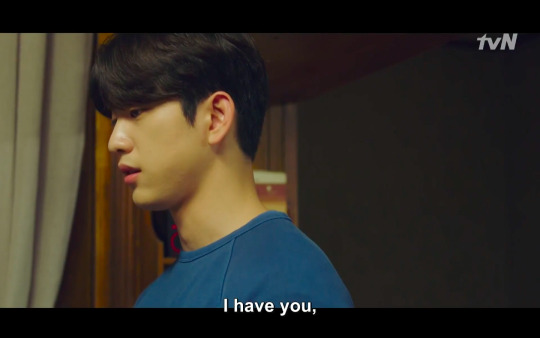

- I loved how Yohan’s confession to GO about his brother was filmed: the camera faced head-on his pain, slipping unbeknownst to him through the façade he always showed to protect himself. But this time, despite his (late) attempts to dismiss these feelings both for him and Gaon to regain composure (the hand gestures to hide his tears, pretending to be tough with the « there’s no such things as innocent people », drinking away his sorrow with a bitter laugh that rings hollow), all this façade fades out in front of Gaon literally by being blurred out in the shot, as if he clearly sees his pain through (his silhouette appearing clear-cut between Yohan’s gestures). I know it’s a pretty classic shot but it fit well with this scene. He clenches his jaw in the next shot, moved by Yohan opening up.
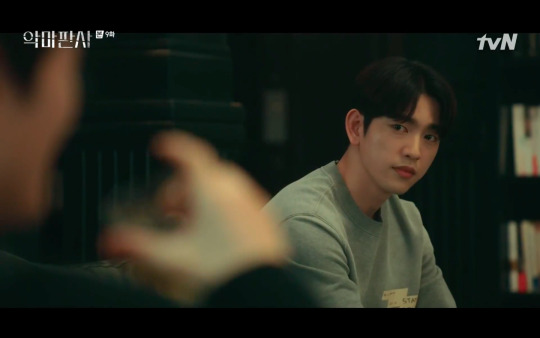
- The dinner scene was really moving …! Especially when you put the colder tones the kitchen had when we first saw Yohan have dinner by himself next to this scene, full of light in contrast! I wonder when the OST playing will be released, it was so beautiful and reminded me of My Mister’s OST (especially Rainbow!). I look forward to the lyrics, because most of the time the OST gives more layers & depth to the story and the characters! (please don’t let it be about Yohan’s budding feeling of a true ‘home’ ;;) I didn’t realize it upon my first watch, but Gaon really took the cutlery hostage, it cracked me up!

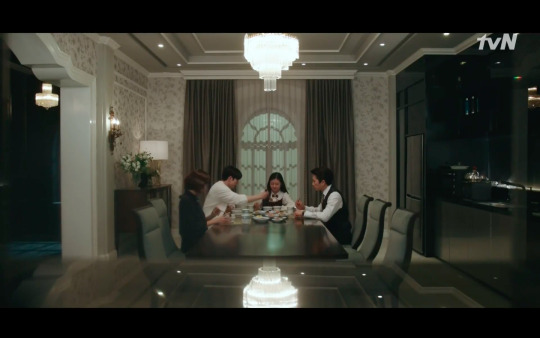
- The parallels in this show will be the end of me: Yohan went from the « i’m so sick of this place » (ep. 5) to asking K to drive him « home » with a delighted smile.
- I liked the parallel of Yohan’s reaction to GO/Sun-Ah sitting in his office chair, impeding on his space (he reminds SA to stay out of it, the first time politely, the second time almost grimacing, his jaw clenched: « Just because you’re the head of the OSC doesn’t mean you can barge in like this (…) So please stop barging in like this. », while he says nothing to GO)
- At the beginning of ep. 10, we have Yohan saying he doesn’t like « hanging out with people » & by the end of it, Soohyun saying « My childhood’s best friend is hanging out with a rich guy ».

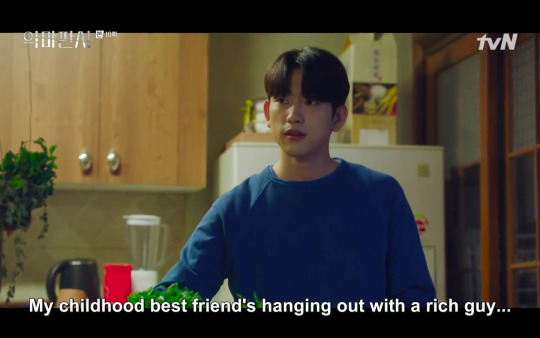
- These two episodes gave more insight and nuance into Sun-Ah’s character, which was very nice ; and also Cha Kyung-Hee’s comeback (and her last confrontation with Sun-Ah!!!!)
- The people following Juk Chang also targeted sexual minorities according to the subs i had, i wonder if it will be addressed again sometime in the drama.
- I loved Elijah’s « hacking » technique scene, i felt proud too! I always look forward to her scenes (and Kkomi’s too haha)! And her reaching out Gaon’s shoulder for the first time ;;
- The ‘humans lose their minds when they think they’ve lost what they have’ ……… repeated twice by YH ………… It will hit hard and all those lines will come right back at us viewers, but i’m not prepared haha! And also for the ‘if you want revenge, don’t hesitate’, i hope it doesn’t foreshadow a future revenge Gaon will execute without hesitation aaaaaa
Also, what lawyer Ko said about himself in ep. 8 may apply to Yohan’s case by the end, will he atone for what he did someday? (« I’m no longer a lawyer. I’m just a criminal. When all this comes to an end, I’ll pay for what i did. »)
- I really loved Yohan’s efforts to take into consideration both Elijah’s (he refrained himself from acting rashly like the last time she went out and listened to her) and Gaon’s feelings (stopping him from endangering himself recklessly, not forcing him onto the revenge path lest he’d regret it afterwards, and helping him to face the truth rationally).
- « She’s hungry for affection. No matter how much you hate the world and the people in it, you can never live alone. You always need someone to rely on. As long as you’re a human being. » Many people commented on it, Gaon must speak from his own experience and empathizes with both Elijah and Yohan’s situation. These two episodes showed how Gaon cares for the Kangs more openly, and i live for it!
- Give me that domestic scene where Gaon plays cards with YH, the nanny and Elijah! And also more K and lawyer Ko scenes!
- Jinjoo’s and Gaon’s intervention in the trial were gold! And Satie’s Gnossiennes rearrangement playing in the background during Juk Chang’s speech, it’s the cherry on the cake haha
- By the way, there was also an arrangement of Rachmaninoff’s piano concerto no. 2 during the first charity event Yohan went with Jinjoo in the earlier episodes, it was also beautiful!
- GO’s Awkward Smile. I have no words, it is now forever imprinted on my mind.
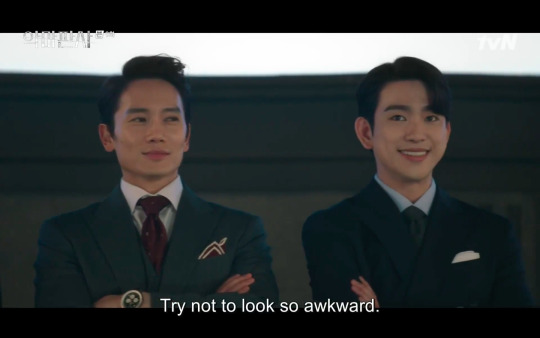
Have a nice week and take care!
60 notes
·
View notes
Text
RWBY Recaps: Volume 8 “Ultimatum”
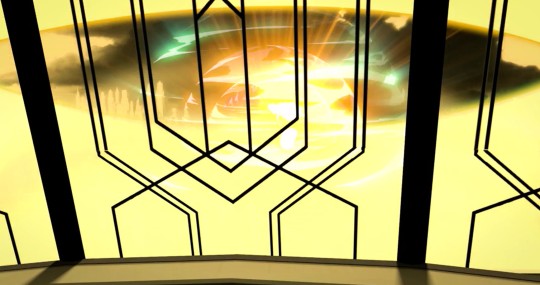
Welcome back, everyone! We had an unexpected break last week due to the horror going on in Texas. I'm glad we did. Not because of any salty "RWBY is bad right now yay free Saturday" feelings, but because keeping to a schedule for a fictional webseries should never take precedence over peoples' safety. I can't believe I need to type that sentence out, but it's true! Over the last seven days I've seen fans who are not merely disappointed by the mini hiatus (understandable) but outright hostile towards the crew because they... were ensuring everyone survived during an unprecedented emergency? Yeah. Given the highly critical nature of these recaps — including today's! — I want to be clear that my thoughts towards Rooster Teeth's creative choices are distinct from any thoughts about the crew itself, including the most basic forms of compassion like, “I sure hope everyone is okay over there.” In an age where it has become horrifically common to harass creators and even send them death threats over stories, it has likewise become necessary to remind people: Don't do that shit. Never do that shit. If I can teach anyone anything at all, let it be that!
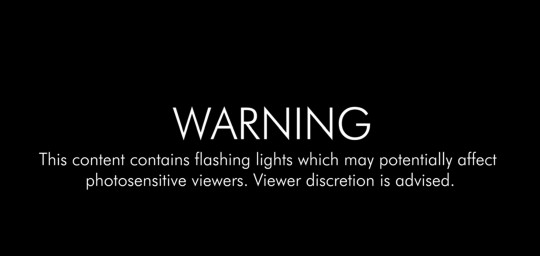
Anyway, dark fandom reminders out of the way, let's dive straight into our delayed episode. It was certainly a doozy. Titled "Ultimatum," we open on a trigger warning for flashing lights. Good on Rooster Teeth for including that, though I do wonder if creators shouldn't be including time stamps as well? Or perhaps a note that you can find those time stamps in the credits, avoiding any (minor) spoilers for everyone else? I'm not photosensitive myself, so I certainly don't mean to speak for that group, but my first thought was, "So how would I watch this episode if I was? Hand on the pause button, hoping I stop fast enough as soon as the lights start?" Hard to do given the surprise nature of the scene. Really, my answer would be, "Wait for the fandom to post warnings of their own, likely including where it happens so I know when to skip" which is perhaps an indication that this information that should be included from the get-go.
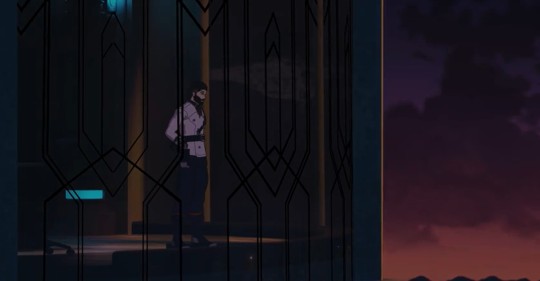
But I am glad the warning exists, regardless. The episode itself begins with a shot of Ironwood looking down at the kingdom. He's used his windows as a vantage point since Volume 7, so that's nothing new, but something about this particular shot reminded me of Ozpin, looking down from his tower. I'm sure the response from many would be simply, "Ah yes, the two power hungry dictators watching over their victims," but I think there's a much more nuanced reading here about leaders being expected to fix the literally unfixable and what that responsibility does to an individual. Of course, it's a nuance that is absolutely obliterated by the episode’s end, but the implication existed for a hot second!
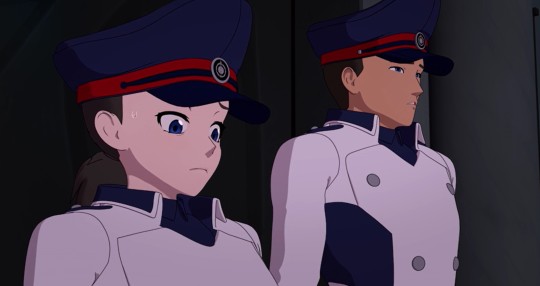
Two other soldiers are in the room with Ironwood, reporting that Cinder has helped Watts escape. They try to soften this with news that they still have Jacques in custody, but receive only a, "I don't give a damn about Jacques Schnee." Which, fair. He's pretty useless at this point. It's when Ironwood learns that both Qrow and Robin escaped too that he really gets mad, something his subordinates have been expecting given their scared expressions.
Now, I'm treading lightly here because I realize how this is going to sound given the end of our episode, but I still want to note that outside of that ending... this is a weird take? Just hear me out. Since Volume 7 the show has worked very hard to make Ironwood seem scary and unstable — bad setup for what we end with today — but the problem is that none of it works in context and it certainly doesn't work when compared to other characters' actions. They are literally in the midst of an unwinnable battle and thousands of his people are dying. If the audience wants a human being — who also just lost a limb and was betrayed by half his allies — o remain perfectly poised and polite during that, sorry, but that's not how human beings work. But even beyond this, what’s the message here? Ironwood raises his voice, so does Yang. Ironwood hits his desk, Qrow hits a child. If we're going to examine how Ironwood handles his stress and anger, he often handles it better than many of our heroes. Namely, by continually taking that anger out on inanimate objects. I kept waiting for him to attack his subordinates or attack Winter this episode, especially given where we end up, but it never came. Ironwood always has enough control to break the desk or punch the wall, not the person in front of him. Which, of course, would not be a good thing in the real world. I want to be clear given these sensitive subjects that if someone is breaking things in your presence that's a major problem to address. But this isn't the real world. This is a fantasy world in the middle of a war, populated by other characters who express their anger by punching people, slamming them into walls, or screaming at them until they run away. The story wants us to fear Ironwood long before he makes his objectively horrific choices and it tries to achieve that by showing us characters who are clearly terrified in his presence, by giving us a string of broken objects in his wake. But those details don't land well when we compare them to other instances of stress. In the same volume I have watched Ironwood take a deep breath to calm himself down when things have gone horribly wrong. I've also watched Weiss start a conversation by threatening her defenseless brother. So again, what’s the message here? It can’t be that acting violently towards someone = villainous behavior because, as established since Volume 6, that’s common for the heroes. Why are these subordinates terrified about Ironwood slamming his fist on a table, but Whitley has no problem hugging the woman who threatened him? Obviously there is a HUGE difference between our main group and Ironwood when it comes to other actions (cough-bomb threats-cough), but these day-to-day moments don't match up. The show wants to use violence as a way for us to easily identify the Bad Guy while ignoring all the times when our heroes do the same thing.
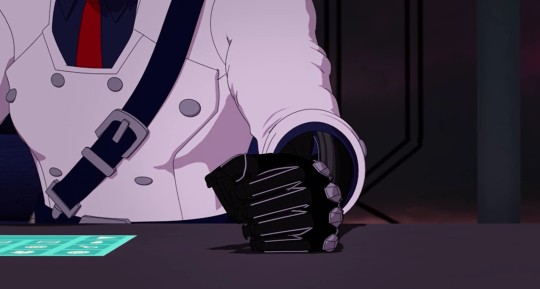
All of which isn't meant to be a defense of Ironwood. As we'll see in a bit, there is no defense for what he's done. Rather, it's a way of acknowledging just how badly he's been written. Why does a man who consistently reins in his anger and takes it out on objects suddenly shoot a councilman for literally no reason? Why does a man defined by wanting to save as many people as he can suddenly threaten to bomb his city? Ironwood's characterization is all over the place, in the sense that they keep writing him as the morally gray, sometimes harsh, but ultimately compassionate man he started out as... up until they need a villain. Salem isn't here yet, so Ironwood can shoot Oscar. Salem isn't attacking yet, so Ironwood can shoot the councilman. Salem is currently reforming, so Ironwood can threaten YJR and Mantle. He's the B-plot villain whenever Salem is out of commission, which is a problem for both their characterizations. This filler doesn't make sense for Ironwood and it severely undermines the threat of Salem. You finally introduce the Magical Big Bad and our heroes are facing more of a threat from a guy with a broken army and three loyal allies left? Hmmm.
The tl;dr is that Ironwood's arc is a disaster and, frankly, it's gotten old reading simplified takes of, "It's just a realistic look at what white U.S. men will do in power sweetie :) " RWBY does not have the context capable of conveying that sort of critical take because our world is not besieged by literal monsters and an immortal witch, to say nothing of how real life good guys do not get deus ex machina canes that fix the problem instantaneously. Ironwood is not an example of anti-U.S. imperialism, he's an example of writers who don't know how to write.
Anyway, I'm getting severely off topic. Obviously Ironwood is a major part of this episode, but the problems demonstrated here are two years in the making. This is the culmination of things I've been discussing for months across hundreds of posts... so I should probably stop trying to summarize it all in a few paragraphs lol. Perhaps when RWBY is over — or Ironwood has died — I'll do a single meta on his character, try to pull everything into one, unified argument.
For now though, we have an episode to analyze.
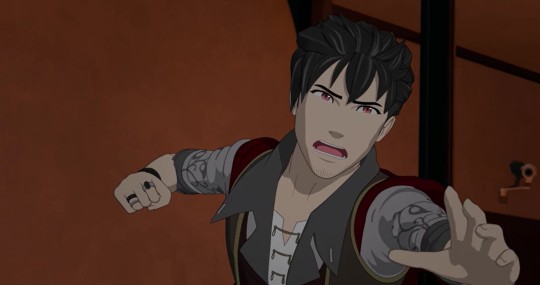
While Ironwood is receiving this news we get flashbacks to Qrow and Robyn. Qrow attacks a soldier in his bird form, which is hilarious. Someone GIF that please. It does raise some interesting questions about this magic though: does Qrow retain his aura and strength in this form (something I thought given his choice to transform during the explosion), or was that soldier just so shocked at being attacked by a crow that he went down easy? We'll never know, because that would require establishing concrete rules for this world. The point is Qrow is going feral in his freedom, throwing punches left and right — did he kill that guard? — while Robyn watches it all from under a rock. They're apparently still somewhere in the facility since all the exits are guarded, but that's not the good thing Ironwood seems to think it is. After all, Qrow is out to murder him. He wants to be there.
We all see where this is going, right? The show is going to ignore Qrow's crazy belief that Ironwood got Clover killed in favor of a "Qrow saved Mantle by murdering Ironwood"/“Qrow got revenge for Mantle by murdering Ironwood” ending. Who cares why Qrow wanted to kill him in the first place now that Ironwood has his finger on the trigger? If RWBY is good at anything, it's writing moments that encourage you to ignore everything that came before it. We'll be seeing more of that in just a bit.
"Damn it!" Ironwood yells, because the show is leaning into its cursing. He orders that the subordinates not return until "you have Qrow Branwen in custody." Here we have another great example of the show conflating what the audience knows with what other characters know. See, we know Qrow has a vendetta against Ironwood. We know their relationship is the important one to the story and that Robyn is incidental. Ironwood doesn't know that. There's no reason for him, as a character, to specify that they only bring Qrow back, but it makes sense for the audience who has the whole, thematic picture. Our understanding of the situation is influencing Ironwood's dialogue, which is... not great.
This entire scene we've had creepy music to hammer home just how evil Ironwood is. Except, as said, he takes a breath to calm down and the music fades. Instead of flying into a rage, hurting someone, or doing anything the music suggests he might, Ironwood calmly calls in for an update — which is when the explosion hits.
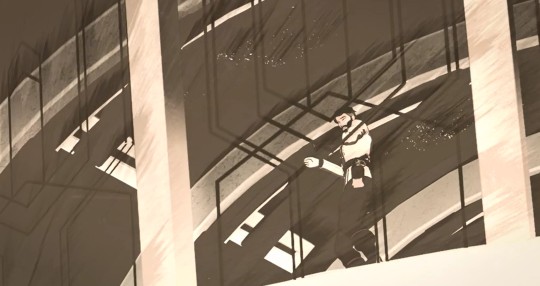
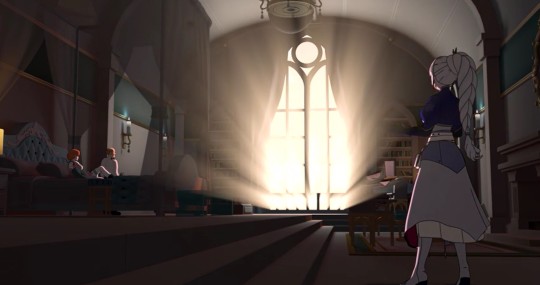
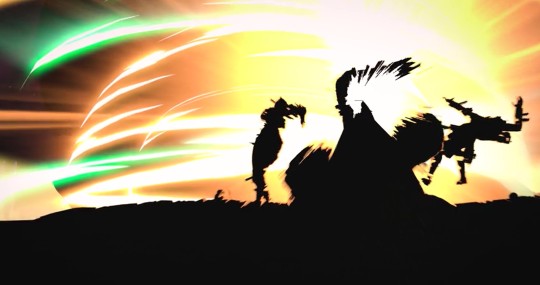
It's MASSIVE, seeming to originate from a lightning strike, which is weird, since it's coming from inside the whale, but whatever. The animation is very dramatic and pretty, as we've come to expect of RWBY, but the actual plot is lackluster at best. It's funny though because I thought for a hot second, when Winter and the Ace Ops were caught in the blast, that RWBY had actually done something exciting. I mean, holy shit! There are the deaths we expect from a battle like this. My god, what is everyone going to do when they realize that Oscar's needless attack took out five characters, including Weiss' sister —
No wait, never mind. They're fine.
Let's talk about that "needless" descriptor for a moment though. Do you all remember, two weeks ago, when I went, "Hey, why isn't anyone telling Oscar that that Ace Ops are approaching with a bomb? They're on a time limit! If someone would just mention that Very Important Information then Oscar wouldn't keep standing around to fight Salem." See, at the time I was frustrated because of how the plot was needlessly allowing Oscar to put himself in danger (especially when the whole point of this mission was to rescue him). Now, I'm frustrated because that same plot needlessly wasted the most powerful weapon the group had. There was no reason for Oscar to use literal lifetimes worth of stored energy when the heroes already had a bomb to do the same job! What was the point of that? I guess he took out the other grimm too, but without the whale that still would have been a challenge with a finite end, one Ironwood's army and the remaining huntsmen should have been able to handle. It doesn't feel justified to have Oscar use a weapon kept on the bench for lifetimes when there was another option literally minutes away.
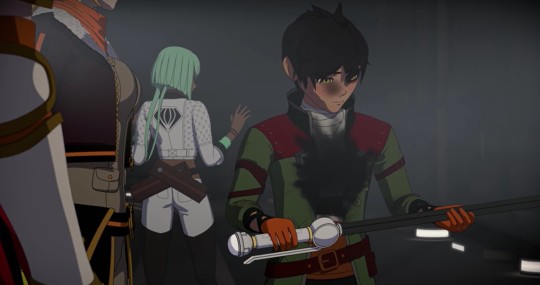
There's so much wrong with this I need another list. So:
Ozpin's cane supposedly stores kinetic energy, which may contradict what we've seen from it before. Regardless, we’ve never heard about this. The all powerful weapon comes out of nowhere
It also begs the question of why Ozpin wouldn't use that power at Beacon and why he wouldn't insist that they try to get their cane back while captured. You had an out this whole time! But we’re going to ignore that because Oscar is a little hesitant?
Which makes YJR's presence even more useless than it originally was, which was already pretty useless. Oscar essentially rescued himself
This kinetic energy miraculously doesn't hurt any people or buildings, just grimm
So what is the point of Silver Eyes? That's been their MO since they were first introduced. Sure, Silver Eyes can be used far more often than Ozpin's cane, but it still feels like a let down to learn that the Big Secret behind this weapon is... the exact same thing Ruby has been doing for years
Like Ruby, Oscar likewise didn't need any practice or training. He just set off this massive attack perfectly and without issue
We have now eliminated the biggest threat to the cast instantaneously — the whale and the other grimm — with no effort from the rest of the heroes. Like the Hound, the stakes are obliterated with no satisfying work on the part of our protagonists
Instead, as said, the actual plan already in place never happened. The bomb just... goes back. Kind of like how Cinder attacked and then just went back to Salem. Penny woke up and then just got knocked out again. We continue to go in circles
This is because no one took two seconds to tell Oscar, "There's a bomb on the way"
Because this threat is gone the show needs a new one, hence Ironwood randomly threatening Mantle with said bomb
The one way we might have justified Oscar blowing up the whale instead of Winter is if he did it to save Hazel, but Hazel is implied to be dead
Maybe he's alive, but if he's not that happened off screen and we're not sure how. It couldn't have been because of the blast itself — everyone else is fine — so what, Salem somehow killed him before she was blasted to bits? While he was holding her?
And there's no body?
Salem was torn apart multiple times during that fight and reformed instantaneously, yet now, conveniently, she's taking her time
None of the characters mention the issues above. None of them admit that there was no reason for Oscar to waste LIFETIMES worth of power when they already had a solution in the works. Fantastic
I need to take a moment to acknowledge that so far this recap feels... bad. Disjointed. Bit all over the place. Which makes a certain amount of sense because that's where my thoughts are at. There's so much going on in this episode — so much wrong with it — that I don't know how to boil it all down into a few, neat claims. This episode is a mess! We're barely a few minutes in and the combined issues of Ironwood's characterization and Oscar's choice have left me reeling. So if you're still reading this, bless your patience, I think we'll both need it for the rest of this journey.
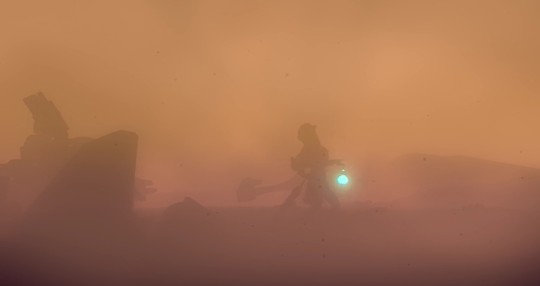
Let's snag a neater plot-point to discuss. Amidst all the chaos Neo literally skips away with the Lamp, clearly thrilled at how her own life is going. Later in the episode she'll text Cinder with the obvious: Salem is going to be pretty pissed when she realizes this is gone. “If you want her name you know what you owe me."
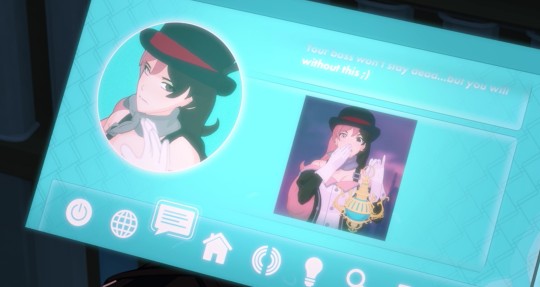
So wait... what is Neo leveraging here? Is she agreeing to give the Lamp back so Cinder doesn't get in trouble with Salem? Give Salem the password she's been looking for? Or give Cinder the password to use the Lamp for herself? What would Cinder even want the Lamp for when she's after the Maiden powers? I'm confused about what Cinder is being blackmailed with. Regardless, she needs the lamp for something and presumably what she "owes" Neo is Ruby. We get a cut to her just to hammer that home.
(Side note: both pictures of Neo are hilarious.)
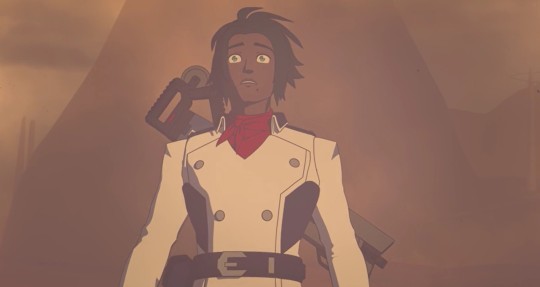
Before that though, back at the whale, everyone is taking stock of the situation when Marrow cries, "Hey, they were still in there!" I feel like this is another scene meant to make him look like the one good guy in the group — he cares about YJOR while the others can’t be bothered — but as always, that reading doesn't fit well with the situation as a whole. The others have barely had time to realize they're alive. I don't think it's a moral failing that they didn't instinctually worry about four betrayers, one of whom attacked them, while they're still checking that they have all their limbs intact. Besides, why does Marrow assume they're dead? The Ace Ops were caught in the blast as well, yet miraculously came out unharmed. They clearly didn't set their own bomb off, so it's logical to assume that YJOR did something themselves. It feels weird to have a "Marrow mourns them and Winter is the only other character who cares" moment when everyone is recovering from bomb shock and no one even knows if the others are dead. But, of course, the show is out to portray only two of these characters as good people, so ignore the logic and run with the emotion of the scene.
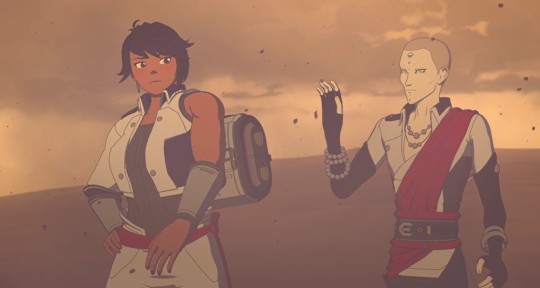
All of which is bolstered by Elm pulling away when Vine puts a hand on her shoulder. Why is she acting cold towards him now? Because they're not friends, remember?
While we get more ridiculous relationship dynamics, Ironwood calls in and congratulates them on the bomb working, but tells them to get back because they have another problem in the works. That would be Qrow and Robyn. Winter decides to tell him about the bomb in person.

We cut to Watts and Cinder watching the remnants of the blast from a rooftop. Cinder has tried calling, but no one answered. Unsurprising, given that Salem doesn't have any other allies left. Cinder says that the plan hasn't changed, she's still going to take the Winter Maiden's power for herself, and Watts can help her by bringing Penny here. He explains that he doesn't have full control over her. Rather, he implemented a virus that is setting her on a single path: open the vault, then self-destruct. Cinder, as one might expect, is furious.
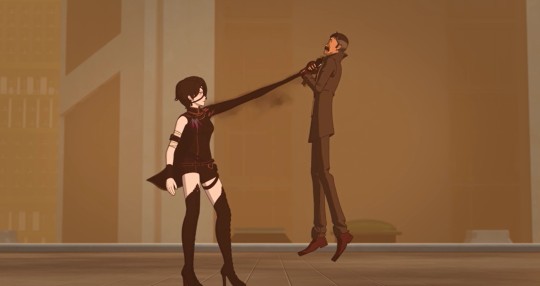
She snags Watts by her grimm arm and threatens to toss him over the side of the building. Thus begins the best part of the episode, hands down. Despite the danger he's in, Watts throws common sense out the window in favor of dragging Cinder in the most satisfying manner possible.
“You think you’re entitled to everything just because you suffered, but suffering isn’t enough. You can’t just be strong, you have to be smart. You can’t just be deserving, you have to be worthy! But all you have ever been is a bloody migraine!”
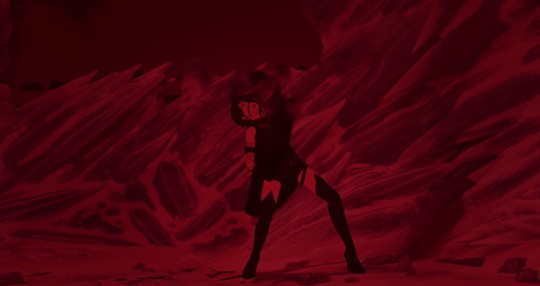
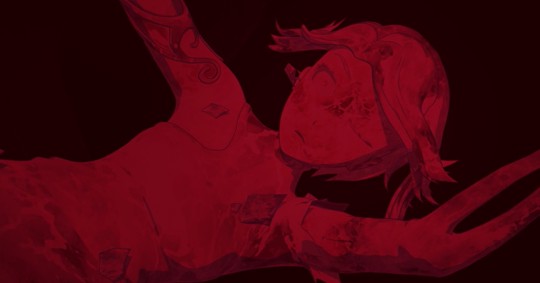
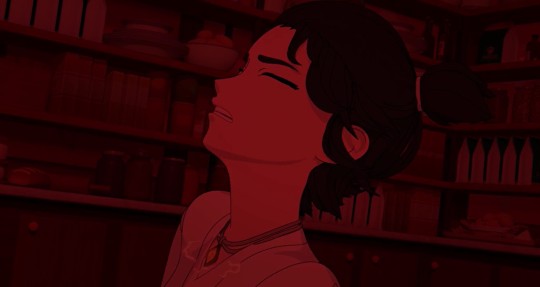
It's true! You know what else is true? This speech could apply to our heroes as well. Accusations of entitlement and reminders to be smart as opposed to just strong hit hard, considering those are the same flaws our protagonists are struggling with. The difference is that Cinder, miraculously, listens, pulling Watts back to safety and going to cry by herself. That moment is simultaneously more growth than Ruby has gotten and more sympathy than Ironwood has gotten. The woman who murdered Pyrrha is treated more kindly by the narrative than one of our initial heroes and our very first villain has taken more time to reconsider her choices than our title character. You know a show is falling apart when excellent choices are applied to the worst possible character.
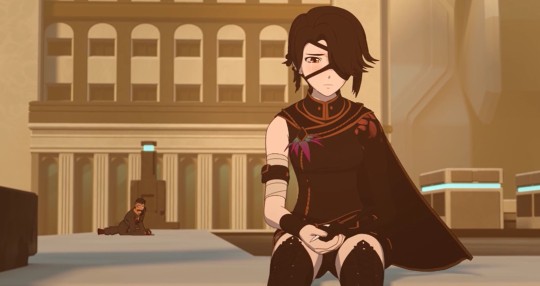
So Cinder is crying while Watts looks guilty and we cut back to YJOR's group post-blast. Yang is finally able to answer a call from Blake who is obviously overjoyed to see her. Weiss gives them directions to the mansion and they ask what in the world they'll do with Emerald, currently on her knees, mourning Hazel.
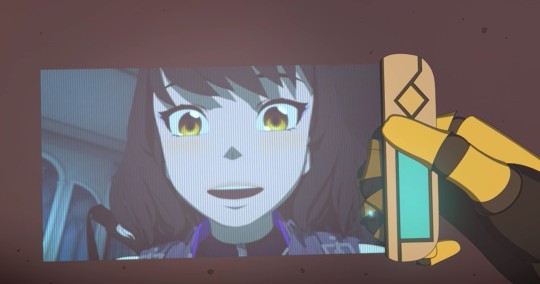
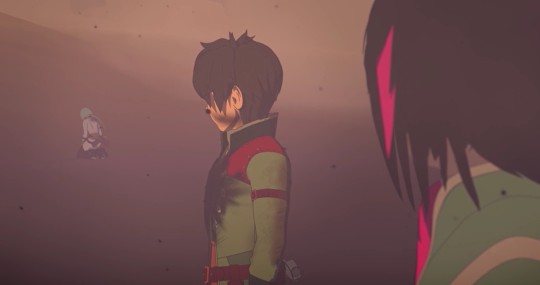
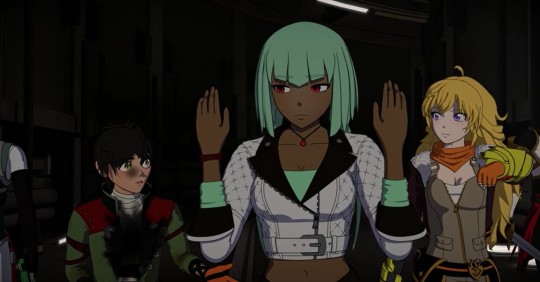
Thus begins the third most frustrating part of this episode. See, on the way back the group continues the conversation about what to do with Emerald, with Yang and Jaune distrusting her vs. Ren and Oscar encouraging cooperation. I can't believe I'm saying this after's Ren's speech and Oscar's entire existence... but I'm team Jaune and Yang here. Look, what Oscar and Ren say — the literal words coming out of their mouth — is nonsense. Ren goes, “We can’t let all of our actions stem from fear," as if Yang and Jaune are being ridiculous for mistrusting Emerald, one of the established villains, after years worth of harm from her. It’s weird that Yang points to her arm as something Emerald is responsible for, rather than being framed or the deaths at Beacon, but the general sentiment of, “She’s done horrible things!” is true. Ren’s perspective is the same simplification that was applied to Ironwood last volume, wherein everyone acted as if he was crazy for fearing an attack on his kingdom... post an attack on another kingdom and pre an attack on his kingdom. Putting generic lines in Ren's mouth about not being afraid makes him sound willfully ignorant, as if choosing to believe that someone is good will magically make them so, to say nothing of thinking it will erase all the harm they've already done.
Oscar at least acknowledges the difficulty here, but then follows this up with, “You don’t have to forgive her… just give her a second chance."

Oscar, honey, that amounts to the same thing in this situation. Allowing Emerald a second chance means working with her, which means trust, which means emotionally reaching a point where these characters can put aside the harm she's done them in an effort to give her that chance in the first place. This actually ties into a post I saw last night, one I've come across before, that claims redemption arcs don't require any suffering on the part of the person who has done wrong. I agree in theory, that prolonged suffering doesn't help anyone, but the problem is that people tend to conflate suffering with consequences and someone who has done this level of harm should face consequences for their actions. The problem with redemption arcs is not that the bad people suffer too much — emotionally and physically beating on them as a form of revenge — but that the people they've harmed are put into situations like this one. If Yang and Jaune let Emerald go like she suggests, they are agreeing that she doesn't have to face any consequences for the damage she's done (which, keep in mind, involves multiple deaths, not including all the lost lives here in Atlas). If they agree to give her a second chance, they are forced to jump straight to some level of forgiveness. We might claim they don't have to forgive Emerald to work with her, but from a practical perspective how are they meant to function, especially during a warzone? Anything she provides them with — information, watching their back in a fight, undertaking missions, etc. — requires trusting her enough to allow those things to happen: working with that info, letting her protect them, allowing her that responsibility. It's all about trust, trust she has yet to earn. In order for a redemption arc to be successful, the power has to be in the hands of the victims. They need to be able to see some justice for what was done to them, be offered some proof that the person in question has truly changed, and have the ability to walk away if they decide no, I don't forgive you, glad to hear you've improved, but please stay out of my life. Jaune and Yang have none of that. There are currently no systems in place for Emerald to face consequences for her choices, she has offered them no proof of her remorse or true motivations, and the other half of the group is pressuring them to give her that second chance without closure or reassurance. None of that makes for a good redemption arc and reducing that to, "So you want to see poor Emerald suffer, huh?" ignores the suffering she has already caused. The group are her victims and they are under no obligation to give her a second chance, particularly under these circumstances, which makes the story's choice to have Ren and Oscar act like Yang and Jaune are being stubborn or inconsiderate a problem. The conversation boils down to, "Give the woman you know to be a liar, manipulator, murder accomplice, and servant of our enemy a second chance based entirely on unfounded faith. If you don't you're letting yourself be ruled by fear."
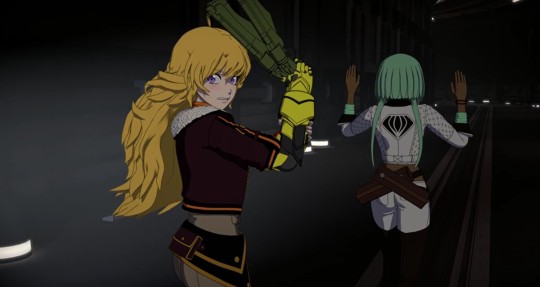
RWBY's touchy-feely themes really don't sit well within its realistic, morally gray premise. We cannot continually have these characters go through hell one moment and then have others accuse them of being paranoid the next. The fact that all of this is wrapped up in the group trusting Robyn, Emerald, and Hazel over their established allies remains beyond frustrating.
Because yeah, you know how Oscar finishes his speech? “I’ve already gotten a lot of help today from someone I don’t exactly trust right now." Meaning Ozpin.
The story is trying to compare Emerald and Hazel to Ozpin.
"Oh hey, I kept a secret from you after lifetimes of watching that secret lead to betrayal and death. I keep apologizing for my mistakes while ignoring that I had no reason to trust a bunch of kids with such world-shattering information and also that you tore it from me in the most traumatic way possible."
"Oh hey, I willingly joined our world's version of the devil and helped her destroy your school, leading to numerous deaths including your friend and headmaster. It was his death that put Oscar in this position in the first place! I then continued to attack your group, leading to another near death of a friend, and a kidnapping, and the destruction of Amity, until I became scared enough to make a run for it."
Which one of these characters is granted an instant second chance? You'll never guess who!
And I do think the word "instant" is important here because just like Jaune and Yang have the right to have distance and justice from Emerald, they had that right with Ozpin too. The difference is they got it. They had the power in the situation, as evidenced by their use of the Lamp and physically attacking him. Ozpin heard what they needed from him — leave us alone — and did that without complaint. They were given months to come to terms with the secrets he kept. They were offered apologies and acts of service to demonstrate intent: saving them in the airship and continually saving Oscar. I don't believe Ozpin ever needed a redemption arc, but even if we think he did, he had it. After three volumes of material Oscar's perspective is still "I don't exactly trust [him] right now" but Hazel and Emerald have earned at least the same amount of trust in a matter of hours? They're really having my boy look at the guy who has tried desperately to do right by him despite unimaginable circumstances, and the guy who tortured him to get information for Salem, and went, "That first guy. He's the one we need to watch out for."
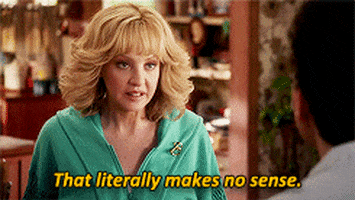
To make things even worse, Oscar tells the others that Ozpin took on all the torture so he wouldn't have to. So he did that and they still don't trust him? If you had told me back in Volume 6 that two years later the group would still be hostile towards Ozpin, while simultaneously urging one another to trust Emerald, I would have said you were lying. RWBY has its problems, but it's not that bad. Yet here we are. I suppose the one silver lining here is that Ren smiles when he realizes Ozpin is back? So at least one of them isn't prepared to draw their weapon at the mere mention of his name.
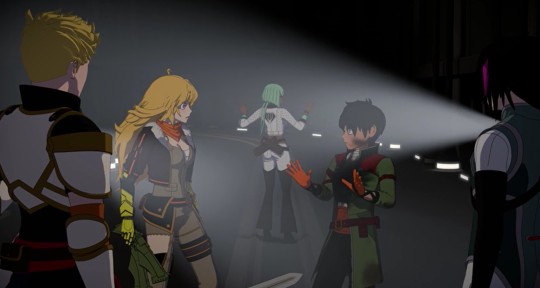
Both these moments raise more questions though. How in the world did Ozpin take on that torture when we clearly saw Oscar getting pummeled for a good portion of the kidnapping? Is that a weird merge thing the story hasn't bothered to explain? I wouldn't be surprised, considering Oscar said last episode he didn't want to use magic because it hastened the merge, he uses the biggest explosion of magic we've ever seen, and nothing has changed. Ozpin is still in the back of his head, thanking him for the tinniest shreds of decency they get. Ren, meanwhile, seems to be back to mindreading. How in the world does he know that Ozpin is back? I assume it has something to do with his semblance, but we don't know what. They could have shown us Oscar from Ren's perspective, perhaps with two distinct emotions swilling around to imply that he sees two different people now, not a useless shot of Emerald with purple flower petals, whatever purple means.
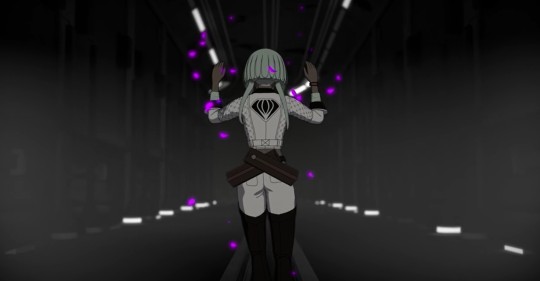
Oh, but no, we shouldn't have gotten either of these scenes. Remember that Ren's aura broke a very, very short time ago? Is it back already? Can he use this part of his semblance without it? Considering it was near impossible to see Ironwood's aura breaking in the Watts fight and we were then mistakenly told he used his semblance in the office, I'm going to go with, "The writers forgot."
Oscar explains that the cane had "lifetime after lifetime" of power in it and though there's still some left, "we have to be careful with how we use the rest." He says that Ozpin trusted his judgement and of course he did! Ozpin also didn’t know that there was a bomb on the way. Yet funnily enough, no one else mentions that, whoops, your choice made in ignorance was a waste and that's due entirely to us prioritizing hugs over basic mission information.
Also, all these explanations take place in front of Emerald. Half the group doesn't trust her, but they'll freely discuss their powers and limitations here. Remember how the group once wanted to talk about magical relics in front of the old lady they'd just met? Yeah, they've learned nothing.
Combine all this insanity with the fact that Ozpin's magic saved the day before Ironwood's bomb could do the same... while Ruby sat in a mansion drinking tea. Who's our hero again?

So things are a hot mess, to put it lightly. Their conversation finally ends when they hear voices and round the corner to find all the Atlas citizens huddled in the subway. For once the show actually writes them in a sympathetic manner, emphasizing how terrified and helpless they are. This image doesn't lead the group to any revelations though, certainly not anything that would tie back to Ren's earlier speech in the snow. No, once again the justified criticisms here are ignored as we hear that “However this fight ends, we could really use someone like you, [Emerald.]” That's it then. Discussion over. We knew as soon as it started that blindly trusting her was being presented as the "right" thing to do and now here we are, deciding that conclusively, despite Jaune and Yang's complaints. By the time the group reaches the mansion, Oscar is defending Emerald from Ruby. We're supposed to just accept that she's a part of the group now, only minimal pushback allowed.
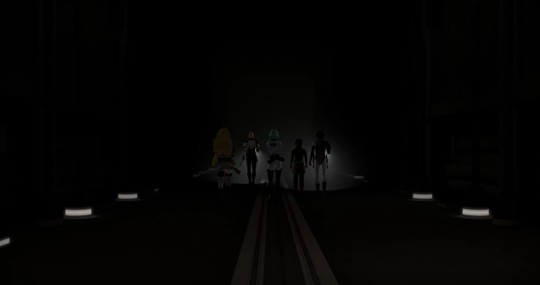
Before that though we return to Ironwood getting news that their bomb never went off. He briefly wonders who else could have done that, but puts the currently unanswerable question aside for what he does know. They still have the bomb and it could be "useful." See, this moment — like shooting Oscar and the councilman — is when Ironwood just randomly goes off the deep end. One minute he's talking about what they've lost and cradling his new arm,
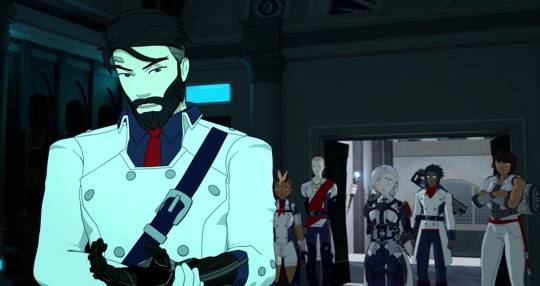
the next he's saying that he should have tortured Qrow to get Penny to obey him! Which doesn't even make sense since I'm pretty sure Penny hasn't ever spoken to Qrow. She wouldn't want anyone to suffer, true, but it's not like Ironwood had a close friend like Ruby to use as leverage. Qrow is just Some Guy to her. Regardless, he thinks Yang, Jaune, and Ren are decent replacements, despite Penny also having no relationships with them. This is what happens when your characters only start breaking up their teams eight years into the story, the response to Ironwood wanting to torture Ren to hurt Penny is, “Does Penny know Ren exists?” But, you know, torture is torture, right? Maybe. Probably not. I mean, if they're going to turn Ironwood into a cartoon villain, they could at least keep him smart.
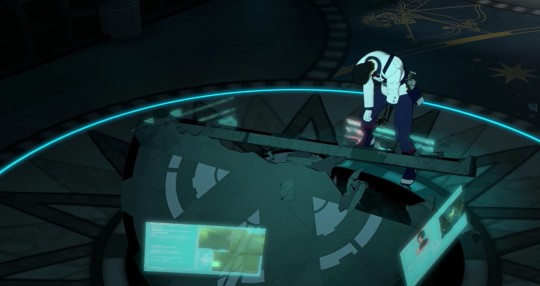
Because all of this is just the height of stupidity. Ironwood wants to torture people Penny barely knows to make her listen (so just grab some civilians? It would do the same job...). Ironwood wants to shoot down empty ships, even though no one, including us, knows where in the world those ships would have gone. Ironwood wants to destroy an entire city to try and save another city. He wants to use a bomb meant for a comparatively small whale and acts like that alone will take out the majority of a kingdom. None of it makes sense! And I know the easy comeback for that is, "Well yeah, Ironwood is crazy and evil" but he's not. I mean he is. Threatening torture and bombings is obviously evil, but he's never been insane, or stupid. As said before, his arc (or lack thereof) is an absolute disaster. The fandom assumes so many things about Ironwood given the opportunity — the whale is a suicide mission. He expects the Ace Ops to die on his order — and the writing hints at so many things that never happen — he's going to hurt his subordinates, attack Winter for disobeying him — and every time what we actually get is a far more compassionate, level-headed character... until he randomly does a 180 and goes, "Let's murder a whole city now!" I never wanted Ironwood to be the bad guy, but they could have at least given me a persuasive decent into this level of horror.
So... yeah. Ironwood has got to die by the end of the volume, yeah? Between Ruby warning the whole world about him and him going into full villain mode, there's no coming back from this.
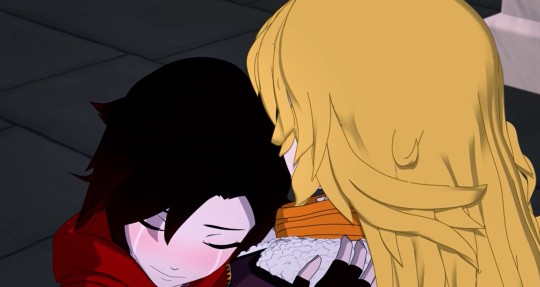
Neo sends her text to Cinder and the group makes it back to the mansion. Remember Yang's criticisms of Ruby's leadership? The ones she conveniently forgot about when Ren started to agree with her? Yeah, those are entirely gone as the sisters hug it out and, presumably, forgive one another for... daring to admit that things are bad? Look, I'm not going to deny that Ironwood's scene with Winter was creepy as fuck,
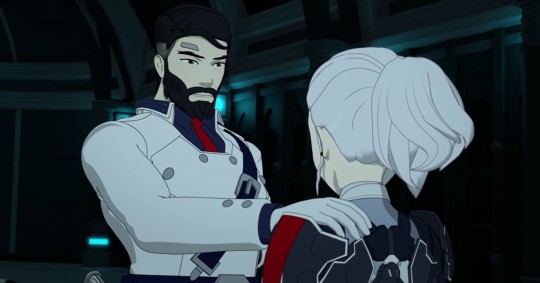
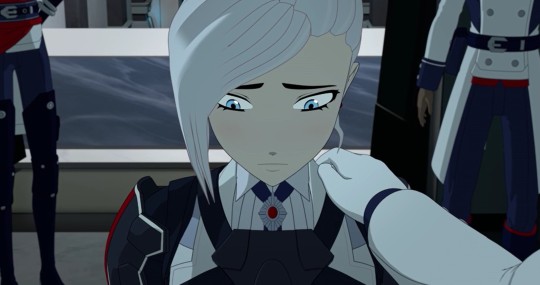
but I'm not of the opinion that the heroes are any better when it comes to the theme of obedience. They've attacked one another, screamed at one another, and any dissent from Ruby's leadership results in the questioner being left behind in the snow. We'll accept you again when you fall back in line. I used to adore the relationships in this show, but watching them now is just discomforting. The show might be 100% more obvious with Ironwood, using creepy music, a smile, and that hand on Winter's shoulder, but the concept of, "Sorry I dared to question you before! We won't ever do it again :)" isn't healthy either. The fact that the show keeps erasing theses problems with hugs — Weiss hugs Whitley now, Yang hugs Ruby, someone will probably hug Emerald soon — doesn't make the circumstances any less uncomfortable.
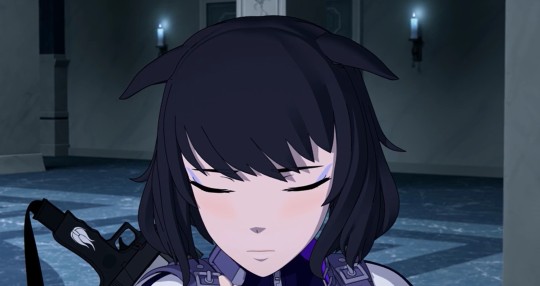
None of this even gets into the Blake and Yang hug. First of all, why is Blake acting like they had a fight and Yang might not want to see her? She's hiding inside rather than rushing to greet them, ears down in a devastated expression until Yang touches her. Combine this with Yang's "Do you think she's mad at me?" and it feels like the writers cut a fight in the final script and then didn't bother to remove the fallout from that. Seriously, where did any of this come from? You can't just have characters act like they've been fighting when they haven’t.
Also, can't forget this.
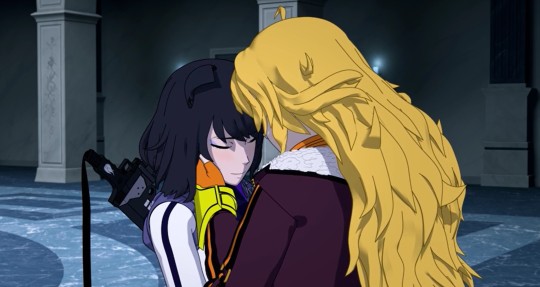
At this point there's nothing more I can say in regards to RWBY's almost-queer baiting. Is touching foreheads more intimate than the hugs Yang gave the others? Absolutely. Is that an appropriate stand-in for overt representation? Absolutely not. This would have been a perfect time for them to kiss. Take out Blake's nonsensical fear and replace it with them both reuniting after their first separation since Volume 5, working under the knowledge that either one could have been killed, finally admitting their feelings. Hell, they don't actually have to kiss. Not all girlfriends are interested in kissing! But they could use the terminology that makes things unequivocally canon. Another forehead touch when we got that in Volume 6? It's not enough, especially not when our straight couples have all been allowed their rep.
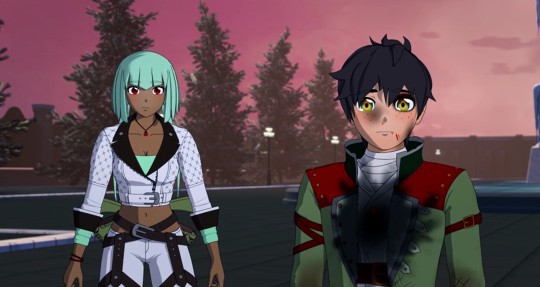
Ren at least wants to know where Nora is. He's presumably told what happened off screen as Oscar tells Ruby that Emerald is their friend now.
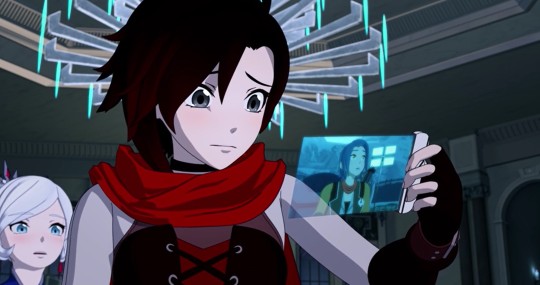
Then an emergency call from May interrupts the reunion and the group learns that Ironwood is bombing the Schnee ships. “Those ships… they were going to save people” Weiss whispers. How? Tell me how they were going to save anyone. Where were you going to take these people where they would be safer than where they are now? RWBY continually asserts things without explaining them, meaning there is precisely zero emotional weight here. Again, Ironwood is far past the point of defense, but I'd be a whole lot more critical of this particular action if I had a better sense of why it's bad. He appears to be endangering the people given May's shout to run — falling debris? — but the further implication is that Ironwood has doomed the people of Mantle by denying them these ships. It's that part that makes no sense based on what we've been told.
Which finally comes to the ultimatum of our episode title: Penny opens the vault, or Ironwood bombs Mantle. Great! So glad this plan is wicked smart and works well for his characterization. It's definitely not a nonsensical, unfounded, overblown change that feels like it belongs in a child's cartoon, complete with dramatic spotlight. Nope. Excellent writing choices all around.
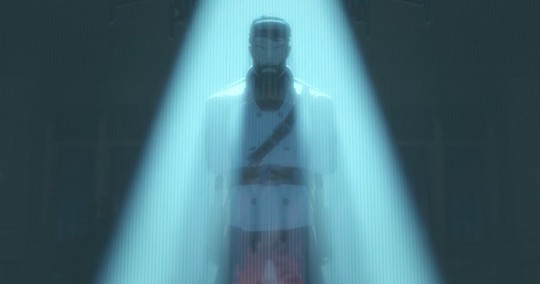
Our final line of the episode is, “I hope you live up to the title I gave you," referring to Penny's job as the Protector of Mantle, and you know what? That line could have been very cool if it was delivered by an Ironwood with a persuasive fall and a halfway decent plan in place. I love that we've twisted the concept of a protector and turned the title into a horrifying, rather than honorable responsibility... I just hate everything surrounding those details.
So, usual RWBY fare.
(At least we get to see that Nora is awake!)
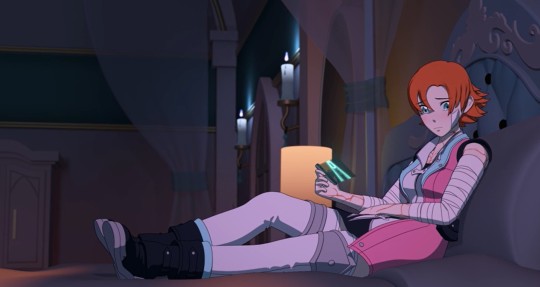
Will things get better over the next four episodes? I doubt it. We're still expecting the rest of the Ace Ops + Winter to ditch Ironwood, someone getting the vault open, the fall of Atlas, now the potential destruction of Mantle, and none of that includes Salem who should reform at any moment. Frankly, I'm not looking forward to any of it. The final leg of a season should make its audience excited to see how everything turns out, not dreading it. I've heard from multiple people that this is the volume that finally got them to drop the show and honestly? I'm not surprised.
As a final (happier?) note: we've finally got a bingo! I completely forgot our board last time, which was a terrible oversight, but we can update it now.
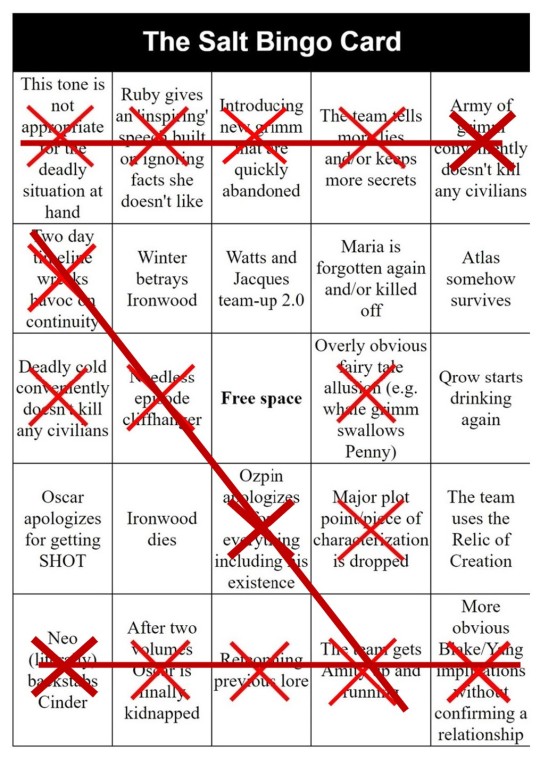
Our army of grimm can't kill anyone now that it got KOed by Oscar (that is the third one hit defeat of a major enemy we've seen this volume. Yes, I'm including the Hound considering it was obviously on its last legs after Ruby's eyes.)
I'm likewise including "Ozpin apologizes for everything including his existence" because he's done nothing but apologize since he came back. The emotion is there even if the literal words are not. Oscar reminded everyone of how untrustworthy he is, but kept the group from jumping them again. And Ozpin thanked him for it.
Neo didn't literally backstab Cinder (shame), but the Relic still counts.
So a triple bingo! Is that how bingo works? Idk, I've never played. I feel like I should have thought up some sort of humorous prize, but sadly I've got nothing. If you think of anything, let me know lol
That’s all then, folks. Until next week! 💜
103 notes
·
View notes
Text
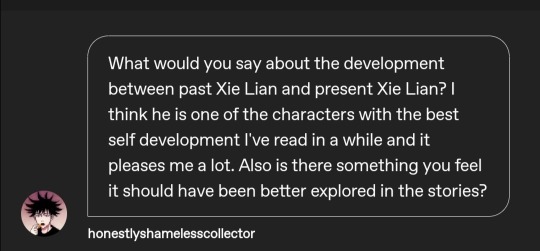
@honestlyshamelesscollector thank you for asking me this!! I'm really happy to share my thoughts, I hope to answer your questions in the best way possible akdjsk
I absolutely agree with you about Xie Lian. He does indeed grow a lot, even though he does so in a traumatic way.
***A little disclaimer: these are just my thoughts here, first impressions having read the novel once, plus watched the donghua and read the manhua a couple of times. I'm no expert at all, but I have lots of feelings about this akdjskfmf
**Putting a read more because long lmao
Young Xie Lian's dream was to become a god and save the common people. And present Xie Lian does it everyday, as much as he can. The biggest lesson he got growing up was probably the fact that he can't save everyone at the same time, but saving (or helping) even just one person was enough. He might be a god, but he is still one person. Having godly powers doesn't make him omniscient or give him the ability to suddenly work on a bigger scale than he could when he was human.
Book 4 in particular highlights just how much the present Xie Lian has changed from the Crown Prince that Pleased The Gods, filled with the idealism of a young man and maybe just a little bit spoiled, to the kind and humble Scrap Immortal that does everything in his power to help the people he comes across.
We see him starting to change as soon as book 2 though. When he tries to both save the Imperial Capital from being invaded and save the Yong'an people from the draught, it's the first time Xie Lian faces the limits of his godly status and power. He divides his time to keep it going for a bit, but in the end he's exhausted and overwhelmed, and he can't do it anymore. Even though he is a god. The inevitable consequences of his own actions and the fall of Xianle challenged his idealism and destroyed his heart so hard that he almost gave in and took his revenge on innocent people. But one person is enough, right?
One could argue that Xie Lian never really had it in him to do it, and I'd probably agree. The whole waiting for someone to help him before releasing the curse, and then trying to sacrifice himself when it eventually was too late to avoid it was enough of an indication for me. It only took the kindness of one person to make him change his heart. If he truly sought revenge, one person wouldn't have been enough. And damn if that didn't ruin Bai Wuxian's plans wonderfully lolll
Xie Lian knew in his heart that the people of Yong'an didn't deserve to pay the price for what happened to Xianle. Even though Bai Wuxian tried (and for a while succeeded) to make him believe it.
Straying from the path that Bai Wuxian wanted him to walk was not as easy as it seems. Bai Wuxian carefully paved all the paths for him, pushed Xie Lian in the directions he wanted him to go with the most violent methods I've ever seen, but Xie Lian always found a way to avoid it, also thanks to Hua Cheng's presence, even when he didn't know it was him (I have so many feelings about that imma cry skfjkefj). Hua Cheng always believed in him and knew what Xie Lian was truly capable of, and boy was he right gdi.
When Xie Lian went through the betrayal of Jun Wu, Hua Cheng's presence reminded him of who Xie Lian is and what he's become. The doubts Bai Wuxian put in his mind, the danger of the Human Face Desease threatening to be freed again, and the resolution to not give in into grief and pain and staying true to the person he had become were again overcome thanks to one person. Xie Lian could have never actually become what Bai Wuxian wanted him to, no matter what he threw at him.
In the end, Xie Lian learnt how to save the common people for real. And he realized that didn't have to do it alone! Instead, the common people themselves were part of the solution (the human array to contain the resentful spirits yknow). It does send an important message, and it's probably the most important thing that Xie Lian learnt: that one person alone cannot save all, if all don't want to be saved. It's a group effort, it takes time and heart and not everyone has it in their heart to risk their lives for the sake of others. Godly powers can only do so much, and a god cannot change fate from above. A god must instead support and protect the people, work with them, give them a boost, and in the end the people will save themselves.
It's a really nuanced and complicated process, I don't know how to explain it properly ajdkfjdl.
It's also worth mentioning that the relationship with Mu Qing and Feng Xin had all the potential to prevent much of what happened to Xie Lian. But just as Xie Lian was young and inexperienced, so were they. And despite all, until Xie Lian stopped thinking of them as servants, he couldn't grow. He had to lose them to truly understand the depth and worth of people believing in him. Which doesn't make it any less painful or sad... Things could have indeed gone differently, but the outcome would have never been the same. I'm glad in the end they kind of sorted it out though.
And the fact that Mu Qing and Feng Xin still cared for Xie Lian when he ascended for the third time was so evident in hindsight. Made me smile when I realized.
Also I liked that in the end Xie Lian didn't go rule the heavens or even go back to it, and instead stayed in the mortal realm to continue doing what he did for the past 800 years. Considering that young Xie Lian said clearly that he wanted to become a god, it's an important thing. It shows that in his mind the concept of gods and their role has changed, and he will stick to his new views despite the possibility of achieving what his young self wanted. Though this isn't just a consequence of book 5, it was shown even earlier when he first visited his palace in the heavens. Xie Lian didn't want to enter it, it made him uncomfortable, and instead sat outside waiting for Shi Qingxuan.
There are so many things to say about Xie Lian but idk if I have the competence to express them all akdjskfj I love his character to bits. His development was not banal in any way, and even though we didn't see all the 800 years it took for him to change, we do feel how gradual that was. Just think of when he met Banyue.
He was still a bit idealistic, telling her that his dream was to save the common people, but he already grew enough of a thick skin to understand when it was worth to pick a fight or not, and he wasn't picky on food (even cooking it himself in his helmet, with outrageous results). It might not seem much, but all things considered, it was a change.
In his first banishment he learnt how hard life was without his Crown Prince status, but he still picked fights with people and refused to eat some things because they weren't as high quality as the food he used to eat at the Royal Palace.
During his second banishment, he learnt to be humble and how problems couldn't be solved with just the right idea. He learnt the grayness of morality and life, how right and wrong are not absolute concepts. He experienced the worst fortune (by his own choice) and learnt how to not let it get to him, how to grow enough of a thick skin to get up each time and not take his frustration out on others.
Truly, Xie Lian is a great character. I have read the novel only one time so far, but I'm planning to reread it soon. So who knows, I might notice more things next time around! This was just my first impression Ahah
As for things I wish that were better explored in the story, I'd say Pei Ming's growth and maybe Ling Wen's motives (though I might have just blinked and missed this last part, because I was still reeling from the Black Water arc lmao).
About Pei Ming, I think he went through a considerable growth since the first time we see him, when he tries to save Little Pei from banishment. At first he gave me the impression of being the usual arrogant womanizer, who would do anything to avoid having his reputation tarnished. But blinking to book 5, we see that he's... Idk, it feels like he's taken that shameless arrogance and put it away, especially after interacting with the Rain Master. Their story is extremely important to his development imo. Their shared past held a place in his heart, and it resurfaced when he met the Rain Master again. I think he was deeply signed by her actions in the past, and he never forgot her.
It's shown when Pei Ming refuses to be saved by the Rain Master and refuses the sword she wants to give to her (which incidentally is the same sword that, yknow, she used to sacrifice herself in front of him back in the days). He says (or better, the people around him say) that it was out of pride, because he couldn't accept that a woman saved him. But he never confirmed or denied it, instead he ran after her "to help".
At the end of the story Pei Ming is not as loud and proud of his reputation as he was in the beginning, instead he seems humbled.
I think the Xuan Ji case also had an important role in his development. Considering how we see her dissolve having found peace after talking/fighting with Pei Ming during the Mount Tong'lu arc, I do think that Pei Ming himself must have reflected on himself a bit too.
He also lost his two best friends, Shi Wudu and Ling Wen, so... Yknow, my hualian ship captain must have had some changes.
Especially when it comes to the Rain Master, I feel there are good basis for a good friendship between them, despite the past. The Rain Master never showed open animosity towards him, instead she helped him. It seemed to me that Pei Ming is the one who believed she hated him, but it was never confirmed.
And maybe if you squint there could be more between them, if you're into that ahah. I wish we could have seen more of his grown version, though I do understand that it happened in the epilogue and the book is already as long as it can be ahaha. So really I'm not that sad it didn't happen, I'm happy that there are signs in the background that "hint" at that instead (if they can be considered hints, idk ahha).
About Ling Wen, ehhhh I want to reserve the right to reread and reconsider. Right now I feel like the Brocade Immortal thing was almost unnecessary? I like her background, how she became the biggest civil goddess of the heavens, but I didn't get why she created the brocade. Again though, I might just go back and reread that part later. Tbh I was reeling really hard after the Black Water arc, so I just blanked on some things akfjskf
Did the Brocade serve any purpose in the end? Aside from being the catalyst of Ling Wen's story arc and being one of the two mighty ghosts in Mount Tong'lu (and also giving that nice hualian scene where Hua Cheng was trying so hard to get kissies from Xie Lian ahaha). Idk, I'd like to hear your thoughts about this!!
I think I rambled enough, if you got to this point wow you're amazing! And thank you for going through this long rant Ahah. I hope it makes some sort of sense! Thank you again for the questions, talking about tgcf made me really happy!
#Tgcf#heaven official's blessing#tian guan ci fu#Xie Lian#Thoughts#I have lots of feelings and I can't wait to reread the novel#Gosh truly a masterpiece#So many good points made here and there about so many things#Also Xie Lian my beloved#He deserves everything in the world and he got it in the form of Hua Cheng#I love them so much y'all#Long ass post#Tgcf spoilers
16 notes
·
View notes
Text
I am so very sick and tired of the toxicity that’s been poisoning the snk fandom as of the last couple years. I gave myself time to digest the ending and my feelings on it, before embarking in a journey to debunk many misconceptions and critiques I’ve seen floating in the fandom.
By the way, by no means I think this ending is perfect. I think this is textbook execution by Isayama to tie together every loose end left behind in an orderly manner, and I think that it was a bit rushed and oversimplified. I would’ve wanted more of Eren and Armin’s conversation, more of the squad realizing what his true goal had been, and some narrative choices I don’t 100% agree with. But still, what I saw in other fans’ critiques post 139 frankly appalled me, so I feel the need to make this. Also, this obviously are my own interpretations, I am not Isayama himself lol
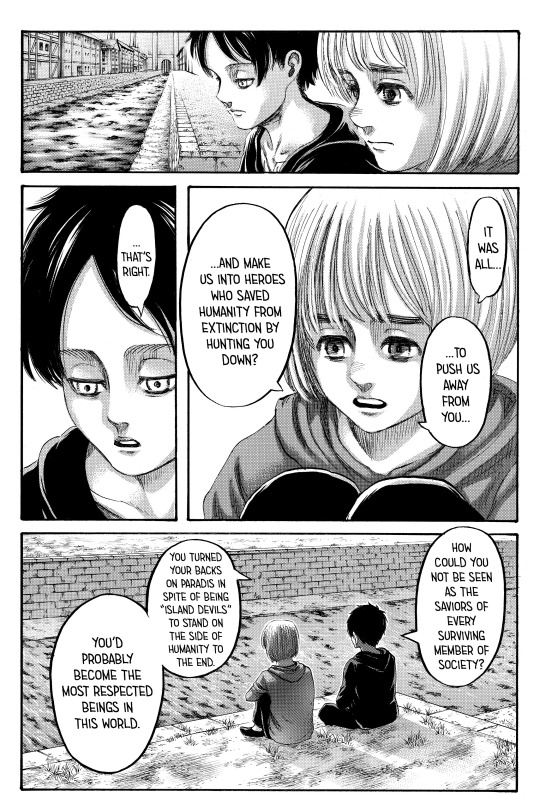
“Ew, so Eren did pull a Lelouch after all”
No, Eren did not pull a Lelouch. While his action and the final result may seem similar, I find very different nuances between the two. Lelouch wanted for the whole world to be united in fighting against him, and thus he made himself the world’s greatest enemy. His will to turn himself into a monster was selfless. Eren didn’t give a damn about the world, he had no noble intentions whatsoever. He said it in chapter 122, his goal was to protect Paradis and, more specifically, his closest friends. He turned himself into a monster, killed 80% of human population, and endangered the lives of those very friends he wanted to protect, so that by stopping him, those friends could be safe. Eren had no intentions to break out of the cycle of hatred or unite the world against himself, he just wanted to give his friends a chance to survive, and that is not selfless, it’s selfish. Eren’s goal was incredibly selfish, and biased, and driven by his feelings instead of rationality. Nothing like Lelouch!
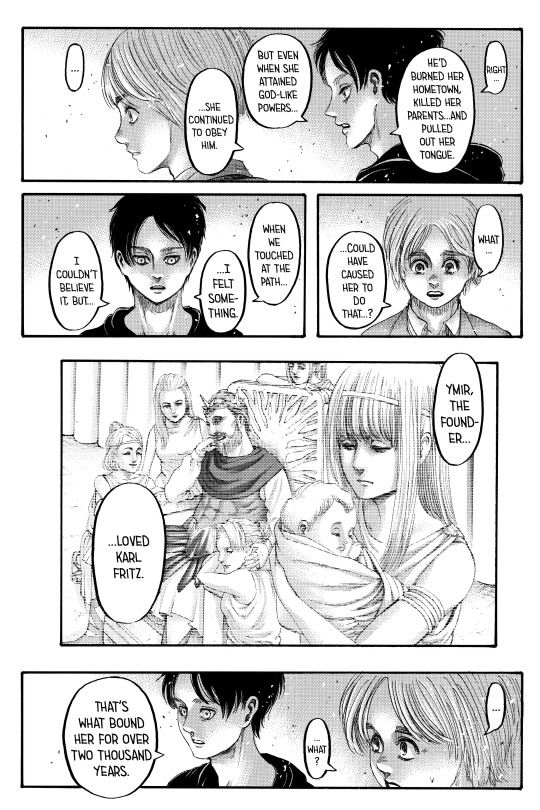
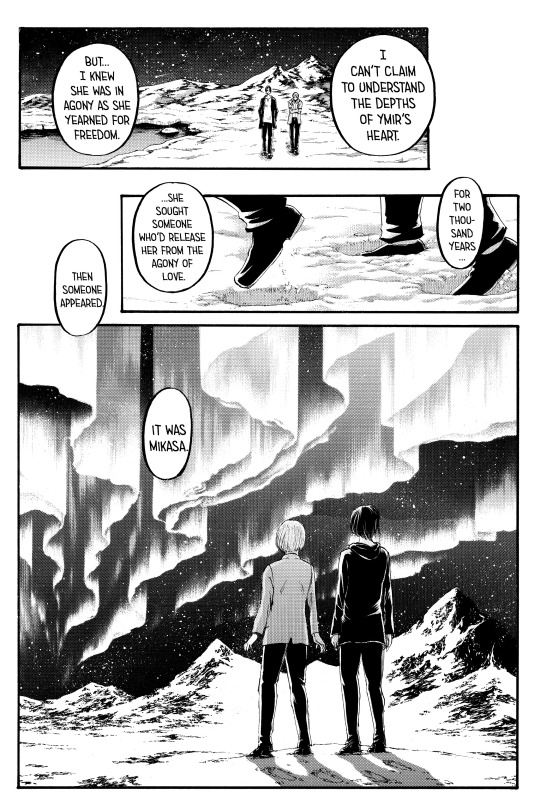
Now this, this I myself am not the greatest fan of. I feel like it makes that great scene in chapter 122 loose a bit of its strength, Ymir obeying the king for 2000 years just because she loved him. Honestly, I always thought there was a bit of Stockholm Syndrome going on, but I didn’t think it would be the only reason. However, like it or not, it’s undeniable that it makes perfect sense in the narrative that aot has always strived to tell. Love has been a theme strongly woven in the story, and it also draws a great parallel between Karl Fritz/Ymir and Eren/Mikasa. Ymir was a slave to her love for King Fritz, just like Mikasa was a slave to her love for Eren, in that she struggled to accept reality until the very end despite the atrocities that Eren committed. Ymir stayed bound by her love for King Fritz, until she saw Mikasa break from her own poisoned love, aknwoledge it, and kill Eren despite of it, or maybe because of it. Only Ymir knows that one, heh. But the point is, Mikasa showed Ymir that she could break free of a toxic love, she was that someone that Ymir had been waiting for to finally free her of her burden.
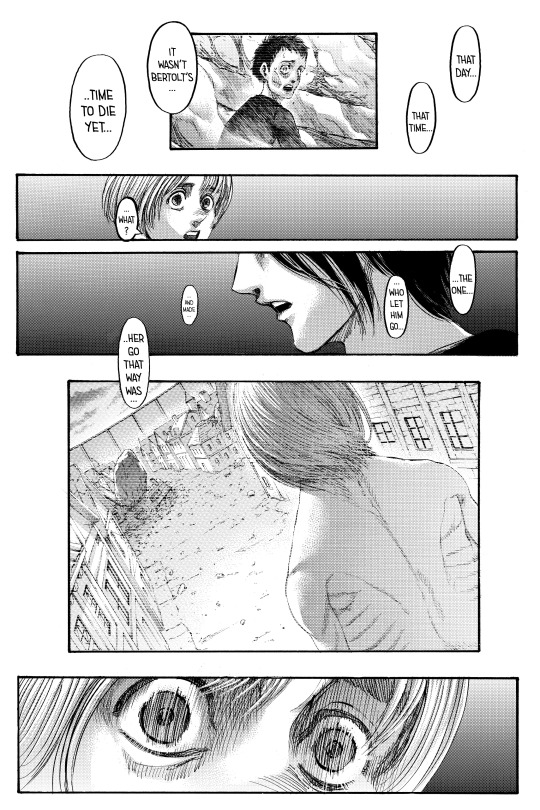
“What? But that makes no sense!”
Now, on my first read, I simply thought that Eren had ordered Dina to avoid eating Berthold, and that he had made her walk down that road unaware that his mother was trapped (because we know that the Attack Titan’s future memories aren’t infallible, there are still gaps), killing her indirectly. I’ve since then read some theories stating that Eren willingly killed his own mum in orther to give kid himself a reason to feel enough hatred to kickstart the whole story. Honestly, I like this version maybe more! But let me explain to you why this is not a plothole, like many people think. In this same chapter, we have Eren explaining how the Founder’s power works in synergy with the Attack’s: “There’s no past or future, they all exist at once”. This means that time travel in aot doesn’t work in a manner where Eren extracts himself from time and space, and from a separate realm he operates on the past. The way I understood it, the mechanics works kind of like Tokyo Revengers’ time travel. MInd you, I only watched episode one, so my understanding might be jackshit.
Spoilers for Tokyo Revengers’ episode one. In the show, the main character loses consciousness and finds himself reliving his past. He interacts with someone in this “new” past, and when he wakes up again in the present, past events had been over-written by the changes he made. I think this is how aot timetravel works, with the exception that, since past and future (and present, of course) all happen at once, side by side, there is no old past to be rewritten, neither a future to return to, and present Eren wouldn’t be aware of the changes that his future self would make. It creates sort of a time paradox, yes, in the sense that there’s a loop where present Eren’s mom has been eaten because future Eren, in the future, operated on the past by causing past Eren’s mom to be eaten, but all these Erens are one and the same, as all timelines exist at once.
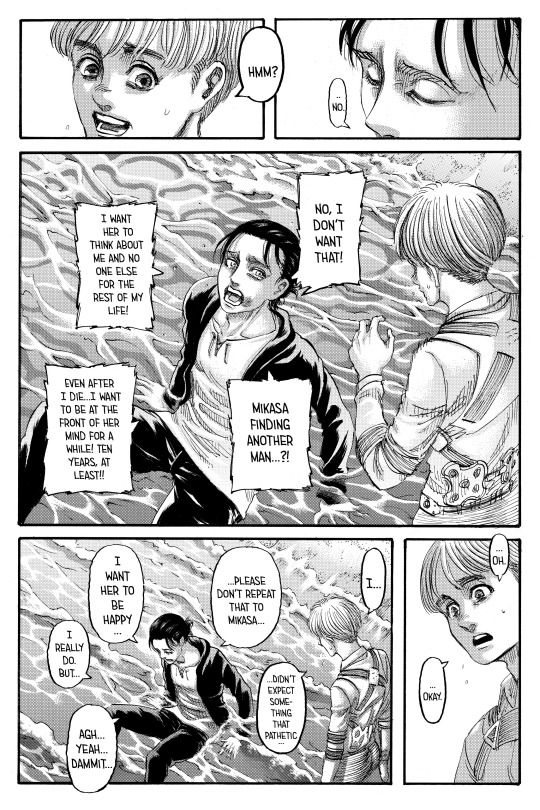
“Boo-hoo they ruined Eren’s character, he’s such a wimp!”
I have to confess (isn’t this appalling, that this is a thing that I have to confess, what the actual fuck), I am an Eren stan. I absolutely do not consider myself a Jaegerist, I think Eren’s option was better than Zeke’s, yes, but it was morally wrong and awful and he absolutely was not only in the wrong, but also if he wasn’t dead I’d want him to be punished for his crimes. I didn’t particularly enjoy him pre-timeskip, and I started to like him because I found his evolution fascinating. I wanted to understand his motives, what was going on in his head, he was a puzzle that I wanted to solve. Maybe because I’m a psychologist, who knows. Anyways, if you’re an Eren stan only because he acted like a chad and now you cry his character was ruined, I’m sorry to say, you never understood him. Eren was not a god, he was not a strategist playing 5d chess with perfect rationality, Eren was the same he has always been. He was a young man spun along by his passions. Eren feels things with burning intensity, he lets himself be driven by his emotions. He almost flattened the world because he was disappointed that he and his friends weren’t the only human beings inhabiting it, for fuck’s sake, he’s always been irrational, selfish, and immature. Of course he doesn’t wanna die, of course he want’s to live with all of them. You really expected a 15 year old hot-headed brat to become Thanos after he suddenly found out he killed his own mum and all his dreams had been crushed? Of course he felt conflicted, of course he suffered, of course he wanted to live, “because he was born in this world”. Honestly, when I read his meltdown, I felt relieved that his character hadn’t been turned on its head, it was heartbreaking to see that he really was the same brat he’d always been, that he’d tried to steel himself to do horrible shit for his friends’ sake and that he felt bad about it! It made me appreciate his character a lot more, I felt nostalgic towards the times when I was irritated by his screaming and pouting. Suffice to say, this is also my answer to all those people that believe his internal monologue to convince himself the Rumbling was what he really wanted were bullshit since he “pulled a Lelouch”. How can it be bullshit? Maybe he planned to be stopped, but he also said that he thought he would’ve still done it if they hadn’t. He also said that killing a majority of the population was something that he wanted to do, not a byproduct of the alliance not stopping him early enough, because with the world’s militaries in shambles Paradis would’ve had time to prepare accordingly. Anyways, of course he needed to convince himself to do this awful thing even if he knew he wasn’t gonna succeed completely, can you imagine how horrible it would be to know your only chance is to kill thousands?
I also maybe think it was because of the spine centipede thingy? When Eren says “I don’t know why I did it, I wanted to, I had to”, he gets this faraway look on his face and we get a zoom in on one of his eyes, which is drawn very interestingly and kinda looks like the Reiss’ eyes when they were bound by the War Renounce Pact? So maybe it was also the centipede’s drive to survive and multiplicate that forced Eren to do the Rumbling so that its life wouldn’t be endangered. I don’t know how much I like this, I feel like it takes some agency away from Eren and also makes it feel like he’s not as responsible for the genocide he committed that we initially though, which mhhh maybe not, let’s have him take full responsibility for this. As I said, I’m not defending Isayama blindly, I do have some issues myself with what went down.
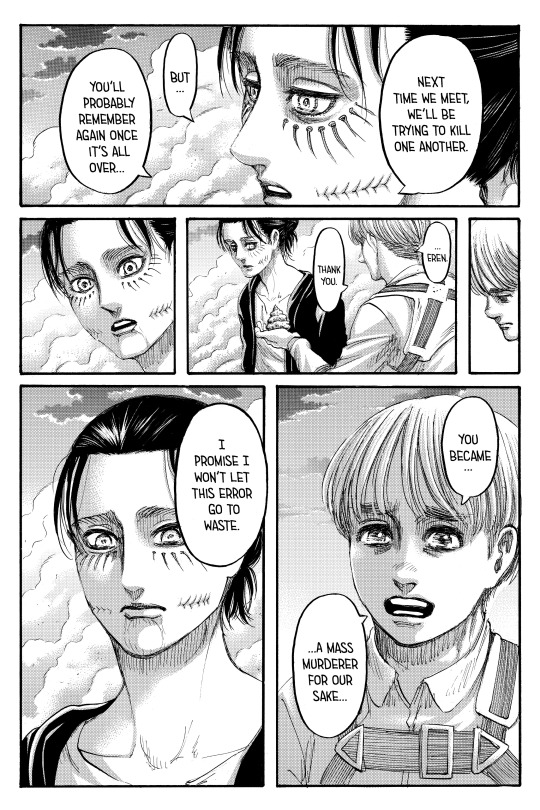
“What the fuck, did he say thank you for the genocide?”
Guys c’mon, this is like,, reading comprehension. Yes, it was poorly worded and a bit rushed, but by now you should have full context to make an educated guess on the fact that no, he didn’t thank him for committing a genocide what the fuck you guys. Armin started bringing up the idea that maybe they should have Eren eaten because he was doing morally questionable things ever since the Marley Arc, which for manga readers was like what, 2018? Isayama has been showing for three years how not okay Armin was with Eren’s actions, how could it make sense for him to thank him for a genocide? You see some poorly worded stuff, and your first instinct is to ignore eleven years’ worth of consistent characterization to jump to the worst interpretation possible? Let’s go over this sentences and reconstruct what they mean.
“Eren, thank you. You became a mass murdere for our sake. I won’t let this error go to waste”. Armin recognizes that Eren had no other choice, but does not condone it. He clearly calls it an error, which feels like an euphemism but for all we know the japanese original term used could’ve been harsher. Point is, he clearly states he think what Eren did was wrong. But he recognizes that Eren’s awful doing opened up a path for Paradis to break out of the cycle of hatred. Not a certainty, but an opportunity. He thanks Eren for giving them this chance, and promises not to waste it, even if it was born out of an atrocity. He thanks Eren for sacrificing himself for their sake, even if he doesn’t agree with the fruit of his labor, so to speak. He’s thanking Eren for the opportunity that his actions gave them, not for the actions themselves! Where the hell do you read “thank you for the genocide” guys, sheesh. I’m mad at y’all.
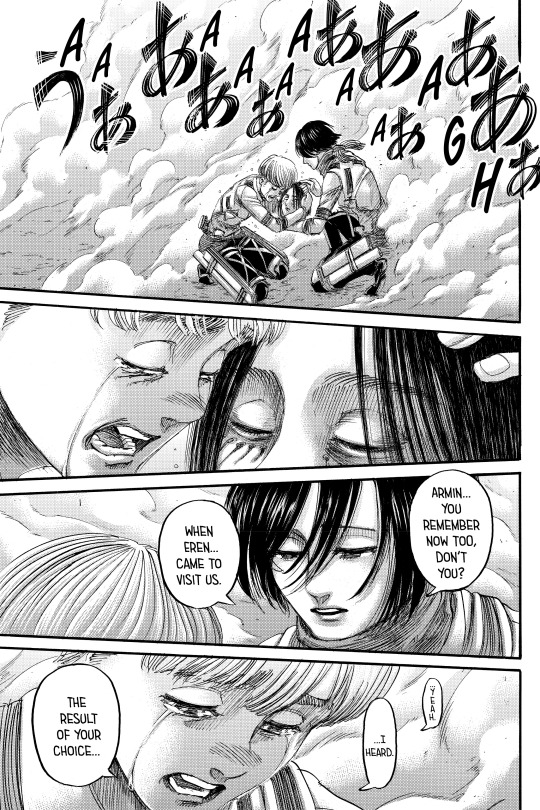
“How could Eren send MIkasa memories if she’s an Ackerman and an Asian, and their memories can’t be manipulated by the Founder? I call plothole!”
Now, here we’re going into speculation territory, so you’ve been warned. I don’t think that that information they gave us was true, about Ackermans being immune to memory manipulation. We know at least that the clan is in some way subject to the Founder’s power, or Mikasa and Levi wouldn’t have been called in the Paths by Eren multiple times. Stories never being entirely true or false, or relativity, better said, has been a strong theme in the story, we know this by Marley’s and Eldia’s different accounts of history compared to the actual Ymir backstory we got. So who’s to say that the belief that Ackermans aren’t manipulable is the truth? Maybe they’re just hard to control, not impossible. We know that by the Founder’s ability Eren experienced past and future happening simultaneously, so he could’ve very well been trying to send those memories into Mikasa’s head ever since the beginning of the story, only just succeeding in chapter 138. It would at least explain Ackerman’s headaches as Eren trying to manipulate their memories and failing. Of course, we’d need Levi side of thing to know for certain, as he had headaches too and we weren’t shown in the chapter if Eren spoke to him in paths like he did with the rest of the squad. We know he didn’t talk to Pieck, but he even went and spoke to Annie who he basically hadn’t seen since Stohess, so I hope he spoke to Levi too. Who knows, maybe he even spoke with Hanji, but she died before she could remember. I wish we were shown that, honestly, I’m sad that it was skipped, especially after Levi said in an earlier chapter that “there was so much he wanted to tell Eren”. Fingers crossed for the anime to expand on it.
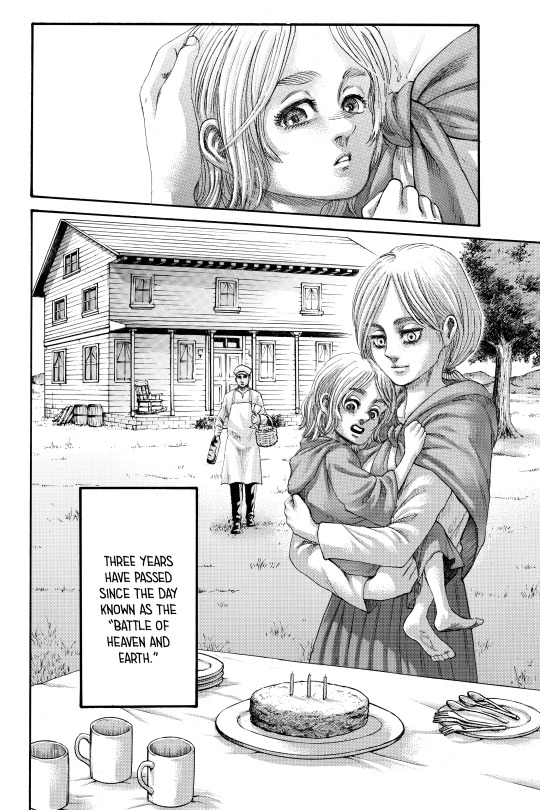
“So Historia’s pregnancy was useless”
What? No, it wasn’t useless! Eren told her to get pregnant to save her life, so that she wouldn’t be turned into the Beast Titan. If she became the Beast Titan, then Eren would’ve had to enact the plan with her instead of Zeke, and yeah, Ymir brought the power of the titans with her, so theoretically Titan Shifter Historia would’ve had her time limit removed, but we saw that the only way for the Alliance to stop the Rumbling was killing Zeke, so Historia would’ve had to die. Useless to say, when Eren talked to her about his plan, she was very vocally against it, so I don’t think she would’ve helped Eren with his plan. It was Zeke or nothing, and the only way for Zeke to keep his titan was for Historia to be unable to be turned, hence the pregnancy. Did y’all read the same thing I read? Anyways, she could’ve definitely been handled better, but she wasn’t necessary to the plot anymore, and her being removed from it in such a way was sad, yes, but it made sense.
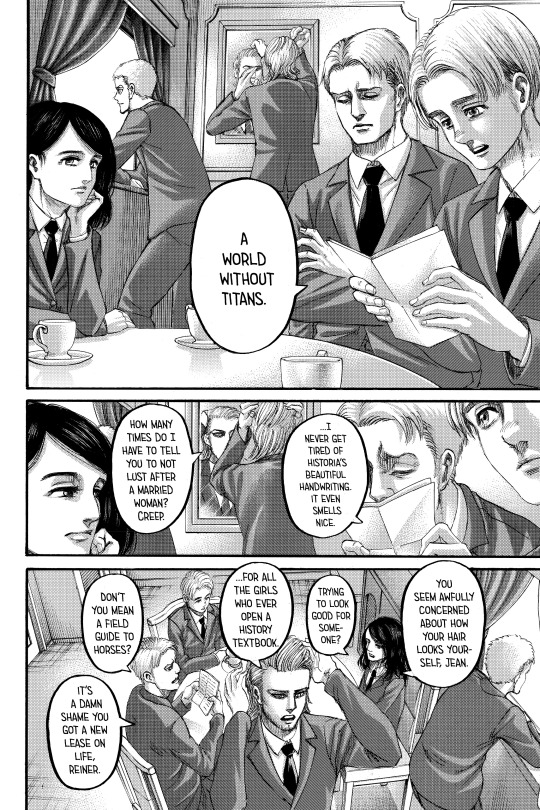
“They massacred Reiner!”
Yeah, can’t really say anything about this. I definitely understand the sentiment behind this scene, which I appreciate. It’s to show that thanks to his Titan being removed and the times of peace approaching, Reiner was finally able to shed the weight he bore on his shoulders and “regress” to his more carefree persona he had when he thought he was a soldier, instead of a warrior. I am very happy for him, and I think it’s a nice conclusion to his arc, that he’s finally happy, but it could’ve been portrayed in a less comic relief-y way. It just sledgehammers all his characterization. Feels surreal that we saw him attempt suicide a couple month ago in the anime and now he’s sniffing Historia’s handwriting.
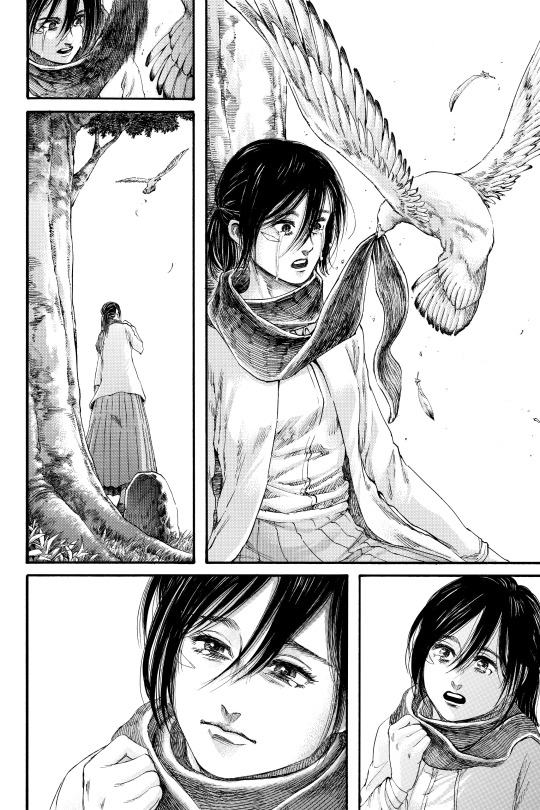
Guys, this absolutely sends me. There are people who unironically believe Eren actually reincarnated in a bird? Guys. It makes no sense, it violates every rule that Isayama established for his universe’s power system. How could he even reincarnate in a bird? Guys, c’mon, this is symbolical! Birds have been heavily used in aot to portray freedom, and this is a nice, poetic, symbolic way to show that Eren who lived his whole life chasing freedom and never actually got it, is finally free, like a bird, now that he’s dead. It’s also a pretty explicit nod to Odin, I think. Aot is heavily inspired by Norse Mithology, and I think there were some pretty clear parallels between Eren and Odin/Loki in the later arcs of the story. Eren has been shown to “communicate” through birds like with Falco in chapter 81, or with Armin in chapter 131. Emphasis on “communicate” because again, this is symbolic, I don’t think he actually spoke through the birds, he simply talked to them via paths, but birds are associated with Eren’s character (see also the wings of freedom, y’know?) and the shots were framed so to give the impression that he was talking through the birds, but he wasn’t. Symbolism. Anyway, I really think they were supposed to be a nod to Odin’s crows.
Aaaaand that should be it! Even though I most definitely forgot some other criticism on the chapter, it’s crazy the amount of negativity floating around. Hope I didn’t bore you!
#attack on titan#aot#shingeki no kyojin#snk#snk manga#aot manga#aot spoilers#chapter 139#aot ending#eren jaeger#mikasa ackerman#armin arlert#aot 139
24 notes
·
View notes
Note
So I saw a post talking about how the person wished BBC Merlin had "embraced Merlin and Arthur's questionable morals a bit more" and it actually annoyed me a bit. Honestly, O think that's actually one of the aspects that the show actually did relatively well. We're shown how Merlin struggles with the decisions he has to make regarding Morgana and we see how it pains him to kill. And yes, Merlin does end up valuing Arthur over the cause but the reason is because he truly lives Arthur. The person also talks about how many of the sorcerers had legitimate reasons for wanting Arthur dead but the show actually does show that from the beginning (Mary Collins and Edwin for a start). The show does acknowledge that many of the sorcerers had reasons for being angry. The person gave the example of Arthur and the Druid camp but they describe it as "actively" killing people including children but what they don't take into account is that Arthur had given the order not to kill women or children and the knights disobeyed and Arthur (a literal teenager) didn't know what to do. And yes, he did still lead the genocide but he had been brought up to believe that he was ridding the world of evil. Yet despite that,, we see how it has tormented him for years. The reason why the show always casts Merlin and Arthur in a good light is because they are good people. They are good people who found themselves in situations where they did not always know the right thing to do and made mistakes. But they also agonized over those mistakes and tried to do better. As far as Merlin putting Arthur's life over the sorcerers, it wasn't simply him putting Arthur above all others (although that was part of it) but also, a dead Arthur wouldn't have been able to legalize magic now would he? And also, it's not Arthur's fault that Merlin chose to do that (just to add that in). So yes, it's understandable why many of the sorcerers wanted revenge but it's also more than understandable why Merlin fought against them. And also, just because some of the sorcerers actions were understandable does not mean that all of the sorcerers actions were understandable. There were plenty of sorcerers on that show that were evil through and through. And I maintain that Arthur remained one of the most morally upright characters on the show till the very end. The show wasn't perfect but embracing the moral complexity of the character was something that was (not completely perfect) but still handled relatively well
The thing with Merlin as a show is that they showcased Merlin and Arthur's complex morality in an incredibly subtle way. It was also owed to the fact that they were played by good actors. Like you mentioned, it doesn't hand over a narrative to you. It unfolds the story before you and allows you to realise that circumstances and relationships change people and that's just human nature. It can't be reduced to "good or bad." Merlin did a fantastic job at that.
I suppose if you need storytelling that is literally in your face about the narrative, this isn't the show to watch. It requires a bit of thinking and there are very nuanced themes that can't be simplified so easily.
Also, slight warning: I don't know whose post you're referring to but in my experience, the people who have these views you're talking about are often watching the show from a pre-conceived, judgemental place so they're just interpreting what they want instead of what is actually being said.
I used to get upset about it but I've mostly learned to stay away from that negativity and only engage in the positive side of the fandom ♡
19 notes
·
View notes
Text
July 2021 Roundup
Discussed this month: The Once and Future King, The Good People, The Secret of Kells/Wolfwalkers/Song of the Sea (aka "Irish Folklore" Trilogy), The Matrix Trilogy, the John Wick Trilogy, Space Jam: A New Legacy
Reading
The Once and Future King (T.H. White) - I've actually read this before, but it was a long time ago and I remembered very little of it so it seemed time for a revisit. Written between 1936 and 1942, this is a surprisingly meta retelling of Arthur and Camelot, very obviously and heavily influenced by WWII, with much academic pondering on the concept of humanity and war and ongoing conflict against Might=Right - looking to the past to try and understand the present. Some familiarity with the legends is assumed, White occasionally making reference to Malory, and there is a strange anachronistic feel - Merlin lives time backwards and talks of Hitler and other 20th Century references, White frequently refers to Old England and the way things were "back then", but also calls Arthur's country Gramarye, the narrative taking place an a kind of alternate history/mythology where Uther was the Norman conqueror of 1066, and yet reference is also made to the Plantagenet kings.
Comprising five volumes (the first four published separately at the time, and the final posthumously), it struck me on this read how each of the first four are structured around the childhood of a major player -Arthur (The Sword in the Stone), Gawain and his brothers (The Witch in the Wood), Lancelot (The Ill-Made Knight), and Mordred (The Candle in the Wind), and how their upbringing played a part in the inevitable tragedy of Camelot. In the final volume, The Book of Merlyn, it comes full circle as Arthur on the eve of his death is taken to revisit the animals of his childhood for much philosophising (at one point Merlyn argues at length with a badger about Karl Marx and communism.)
The Sword in the Stone is the most engaging, with young Arthur (known as "the Wart") and his tutelage under Merlin, being turned into various animals like an ant, a goose, and a hawk to learn about each of their societies (political allegories), and meeting with Robin Wood (Hood) and Maid Marian to battle Morgan le Fay, and the climactic pulling of the sword from the stone. This was of course the source material for the Disney film, although missing the wizards duel with Madam Mim (appearing in the original publication, but removed for the revised version).
The Ill-Made Knight is the longest volume and was honestly a slog to get through, because honestly Lancelot is pretty dull/terrible, and the Lancelot/Guenever love affair less than compelling. Ultimately it's Lancelot's hubris that dooms them - he is warned that Mordred intends to catch him out in Guenever's room, but he goes anyway, and doesn't leave when he tells her to, because he is stupid.
It’s no surprise that the female characters are given the short shrift, but there’s an uncomfortable vein of misogyny running through the book. To wit:
Elaine had done the ungraceful thing as usual. Guenever, in similar circumstances, would have been sure to grow pale and interesting - but Elaine had only grown plump.
And then later:
Guenever had overdressed for the occasion. She had put on makeup which she did not need, and put it on badly. She was forty-two.
Morgause (the eponymous witch in the wood/queen of air and darkness) is a negligent mother whose sole motivation is revenge, Elaine rapes Lancelot by deception, Guenever is hypocritical and shrill (but achieves a sliver of nuance in Candle), Nimueh is a nonentity, and Morgan le Fey is a monstrous fairy. If only White had turned his academic pondering inward and in order to examine the role of women in his worldview other than as damsels or instigators.
But Arthur also gets the short shrift - after all the focus in his childhood, he becomes almost a peripheral figure in the rest of the story until the very end, and we're not actually given much to show why he is the once and future king, other than that he tries to institute a slightly less brutal system.
Ultimately, White is more interested in philosophy than character, and so Camelot's inevitable tragedy feels more clinical than visceral.
The Good People (Hannah Kent) - If the Irish Folklore Trilogy (discussed below) is the beauty and wonder of Irish myths and legends interacting with the human world, this book is the cold danger of superstition and the devastating affect of folklore used as an explanation for life's ills. Set in 1820's rural Ireland, Nora is widowed and left with the care of her young disabled grandson Michael, believed to be a changeling. The local wise woman Nance, who feels the touch of "the good people" sets about to drive out the fairy from the child, believing that the "real" Michael will return, much to the growing dread of Mary, the teenage girl Nora has hired to care for him.
Here fairies are seen as a malevolent force, "sweeping" away women and children, causing bad harvests, and bringing death to the village - to be respected and feared. And then there's Nance, bartering traditional cures for ailments and troubles - some work, some do not, and some pose great danger. On the other hand, this is a remote village where a doctor must be fetched from Killarney, and only one priest who is less than charitable. Neither provide any help or support to Nora.
SPOILERS It's an upsetting read dealing with dark subject matter - grief trauma, child abuse and accidental infanticide, a kind of slow burn horror. If it takes a village to to raise a child, it also takes one to kill a child, as mounting fear and superstition moves through the population like a contagion, heightening Nora's desperation for the "return" of her grandson, and Nance's to prove her knowledge. It's an impeccably researched novel (based in part on a true event) but very unsettling - poor Michael is never really given humanity, and I feel this book would be hugely triggering in its depiction of disability and neurodivergence.
Watching
The Secret of Kells/Song of the Sea/Wolfwalkers (dir. Tom Moore) - I've been meaning to watch these films for absolutely ages, and I finally got to them this month. I’m pleased to say that the many people who recommended them to me were absolutely correct, because they appear to have been made to specifically cater to my interests. Some mild spoilers ahead.
I watched these in internal chronological order as suggested by @ravenya003, starting with The Secret of Kells, set in 9th Century Ireland where the young monk Brendan helps illuminate the to-be famous manuscript and befriends a forest sprite Aisling, under the threat of a Viking raid. Next was Wolfwalkers, jumping forward to 1650 Kilkenny where the English girl Robyn, daughter of a hunter, is drawn into the world of the forest and Mebh, who turns into a wolf when she sleeps. And finally we go all the way to 1980's in Song of the Sea for the story of Ben, who must help his younger sister Saoirse (a selkie) find her voice and bring back the faeries who have been turned to stone by the owl witch Macha.
Although the stories are completely separate, they've been described as Moore's "Irish Folklore" trilogy, and it’s easy to read a through line from Kells to Wolfwalkers in particular - both deal with fae of the forest, and Aisling appears as a white wolf at the end of the film (having lost her ability to appear in human form). I like to think that Aisling is in some way the progenitor of the wolfwalkers - after all, Kells and Kilkenny are less than 200 kms apart.
Song of the Sea is distant from the other two in both time and subject matter, dealing with selkies, creatures of the water. In many ways, Kells and Wolfwalkers feels like a duology, with Song more its own thing. On the other hand, an argument could be made for common fae spirit/s in different forms across all three films - Aisling is a white sprite, Robyn takes the form of a white/grey wolf, and Saoirse a white seal.
The strength of these films other than the folklore is the visual style - I really love 2D animation, and while I appreciate the beauty of cg animation, I often find in the latter’s focus on hyper-realism the artistry can be left by the wayside. These films not just aesthetically beautiful, but the art is used to tell the story - from the sharp angles that represent the darker or harmful elements (Crom, Vikings, the Town), to the circles and rings that represent safety and harmony (the Abbey, the forest, Mebh and her mother/the wolves healing circle, the holy well). The exception is probably the home of Macha, the owl witch, where circles are also prominent and represent magic, and this is often the case in folklore (fairy rings, fairy forts, etc).
Kells is the most stylised, resembling tapestries or pages and triptychs from medieval manuscripts, playing with perspective. I actually saw pages from the real Book of Kells years ago in Dublin, and remember them being very beautiful. We only get glimpses of the Book and the stunning Chi Rho page at the very end of the film, but the style of art is present throughout the film and particularly in the forest where Brendan finds inspiration for his illumination, and on the flipside his encounter in the dark with Crom Cruach, represented as a chalk-drawn primordial serpent.
This style is also present in Wolfwalkers, particularly stark in the way the birds-eye grid of the town often looms over Robyn in the background and in her work at the castle. The depiction of the forest has more of a storybook quality however, as does Song, where almost every frame resembles a painting, particularly the sequences of Saoirse's selkie trip through the sea and Ben's fall through the holy well.
Rav points out in her review that there is the ebbing away of myth and magic in each successive film, contrasted with the rise of Christianity/modernity. But there's circles and rings again, because while the ultimate power of the faerie world is fading away, the interaction between our human protagonists and faerie actually increases with each film. In Kells, we have only Aisling and Crom, in Wolkwalkers, we have Mebh and her mother whose ranks grow to include Robyn and her father, and finally in Song we have Saoirse, Bronagh, Macha, the Na Daoine Sídhe, and the Great Seanachaí.
Watching in the order I did, it does give the impression of the mythological world opening up to the viewer, gaining a deeper understanding and exposure as time progressed. On the other hand, that is also because the human world is gradually encroaching on the world of Faerie, from isolated settlements like the Abbey of Kells, to growing town of Kilkenny and the logging of the surrounding forest, to a modern Ireland of motorways and power lines, and industrialised Dublin where the remaining fairies have moved underground. It makes the climax of Song, with the fairies restored but returning to the land of Tír na nÓg, rather bittersweet.
I also credit the strength of the voice acting - the adult roles are minor but with greats including the dulcet tones of Brendan Gleeson and Sean Bean, and the ethereal Maria Doyle Kennedy (who I wish had gotten to do more). But the child roles are all performed so well, particularly Honor Kneafsey as Robyn, whose growing desperation and distress is just heartbreakingly palpable.
The Matrix Trilogy (dir. The Wachowskis) - I usually don't post rewatches in the Roundup, but I really, really love these movies. I will never forget seeing The Matrix at the cinema as a young teen, knowing nothing other than the tease of the enigmatic trailers, and just being completely blown away by it, and then becoming completely obsessed a few years later in the leadup to Reloaded.
It wasn’t my first fandom, but it was probably the first time I took fandom seriously. I was very invested in Neo/Trinity in particular as well as all the mythological/literary references that fed directly into my interests. I haven’t however gone back and read the fic I wrote, for fear that it is very, very cringe. I know where is is though, so maybe one day before the ff.net is purged.
This is Keanu Reeves at his most handsome, and while he doesn't have the greatest range (as many actors don't, although they don't get as much grief for it), when he's in the zone there's no one else who could do it better. He just has a Presence, you know? A vibe, and it compels me.
This is particularly present in Neo, a character whose conflict is almost entirely internal, burdened by the weight of his responsibility and destiny, both before and after he learns it is a false prophesy. He’s not your typical quippy macho action hero, but much like my other fave Luke Skywalker, is a character who is ultimately driven by love and self-sacrifice. I definitely have a Type of male hero I adore, and Neo fits right in there.
I also really love the sequels, flaws and all, because you know what, the Wachowskis had Ideas and they weren't going to deliver Matrix 2: Electric Boogaloo. Each film goes in an unexpected direction, and not in a subverted expectations ha ha silly rabbits way, but one that does have an internal logic and pulls together a cohesive trilogy as a whole, and how often does that happen these days?
The sequels are so…earnest, with none of the cynical cool detachment perhaps some would have preferred - at its core a trilogy exploring philosophy and the nature of prophesy vs choice, determinism vs free will, and the power of love. Maybe it can be hokey, and some of the dialogue a bit overwritten, but I don't care, there's so much I still enjoy even having seen the trilogy many times over the years.
Not to mention the great female characters - while I'm not sure any of the three strictly passes the Bechdel Test, we have Trinity and Niobe in particular who I love with all my heart. It does kind of annoy me that the Trinity Syndrome is so named, because it only applies in the most reductive reading possible, and Trinity expresses agency (and badassery) every step of the way, saving Neo just as much as he saves her. I mean..."dodge this"/"in five minutes I'll tear that whole goddamn building down"/"believe it"? Niobe piloting the Hammer through the mechanical line in Revolutions? Iconic. There are criticisms that can be made, sure, but the trilogy ultimately loves, respects, and appreciates its female characters (and important to note that the avatars of The System, the Architect and the Agents, are all white men).
Then we have the Oracle, who ultimately holds the most power and is the victor of the human/machine war. There's so much going on with the Oracle I could talk about it all day. It's that fate vs free will question again (“if you already know, how can I make a choice?”), but with the wrinkle of manipulation (“would you still have broken it if I hadn’t said anything?”). Choice is the foundation the Matrix is built on, the unconscious choice for humans to accept the system or reject it - the Architect can't control that, he can only manage it, and the Oracle can't force Neo onto the path she has set out for him, only predict the choices he will make based on her study of the human psyche ("did you always know?"/"No...but I believed"). But she plays with the concept of fate in a complicated web of prophesies for outcome she wants and trusting the nature of Morpheus, Trinity, and Neo to bring it about.
And then there's the visual storytelling - there is so much meaning in almost every frame and line of dialogue. The mirroring and ring cycles not only in the constant presence of reflective surfaces and central metaphor of the Matrix as a simulacrum, but the androgyny of Neo and Trinity, bringing each other back from the dead in successive films (and ultimately both ultimately dying in the third), Neo and Morpheus’ first and last meetings, Smith who is ultimately Neo’s dark mirror, the Oracle/the Architect, just to name a few. I just…really really love these movies? Maybe I’ll do a full post rewatch sometime.
I am however reserving judgement on the Matrix 4 - already there are a few things making me uneasy. Lana is the sole director for this one (Lilly is not involved), and Laurence Fishburne apparently wasn't even asked back, even though Morpheus actually survives the trilogy (as opposed to Neo and Trinity). But I’m interested, and don’t want to go in with any expectations, but rather ready to be surprised again like I was when I watched the first film (and hope I can stay away from spoilers).
John Wick Trilogy (dir. Chad Stahelski) - It was a trilogy kind of month! This genre is generally not my thing, as I don’t have a high tolerance for graphic violence and pure action bores me after a while, but I was in a Keanu kind of mood and I'm always hearing people go on about John Wick so I wanted to know what (if anything) I was missing. While still a bit too violent for my tastes, if nothing else I could appreciate the dance-like fight choreography, even if the worldbuulding is absolutely ridiculous - I mean, literally thousands of assassins across the world chilling in sanctuary hotels, supported by a vast network of weapon suppliers, tailors, surgeons, spy networks, etc? It’s silly, but hey, I was happy to go along with it.
What I do appreciate about Keanu Reeves, and this seems to be a common thread, is that even when in action hero mode (Matrix, Point Break, John Wick, and to a lesser extent Speed), he consistently plays a man who is completely in love with his partner/wife - like, completely, unapologetically devoted to them, and I think that is a big part of the appeal - it's that Keanu energy that is often the antithesis of toxic masculinity, even when in roles that would ordinarily rely on those tropes.
Wick is in many ways the spiritual successor to Neo - insular, taciturn, and even as he's dispatching death with clinical precision. Much like Neo, Wick is a character who is somehow Soft (tm) despite all the violence. I once listened to a podcast where they amusingly discussed the Reeves oeuvre as simulations of Neo still trapped in the Matrix, and it’s very easy to make the case here and imagine John Wick as Neo plugged back in after Revolutions, mourning Trinity and set on mission after mission to keep his mind active (and it would certainly explain why the guy hasn’t dropped dead after being stabbed, beaten up, strangled, hit by a car, shot, and falling off a building). It’s a fun little theory.
Stahelski was Reeves' stunt double and a stunt coordinator on The Matrix and there's plenty of homages in the visual style and reuniting Reeves with costars Laurence Fishburne and Randall Duk Kim (who played the Keymaker).
I did also find it amusing that Wick is also often referred to as babayaga (equated in the film to the bogeyman). Well, Wick is in many ways a witch who lives in the woods, just wanting to be left alone with his dog, and there is a supernatural energy to the character, so...I guess?
Space Jam: A New Legacy (dir. Malcolm D Lee) - I took my niece to see this at the cinema and it was…pretty much what you would expect. I thought it was fine for what it was, even if a bit slow in parts (it takes a looong time for the looneys to show up) and I wonder if they have the same cultural pull they had in the nineties (the age of Tweety Bird supremacy). But the kids seemed into it (my niece liked porky pig) and that's what counts I guess.
This time, the toon battle royale takes place on the WB servers, where evil A.I. Don Cheadle (having the time of his life chewing the cg scenery) wants to capture Lebron James for...reasons, idk. James and Bugs have to find the rest of the looneys scattered across the server-verse, a chance for WB to desperately remind people that they too, have media properties and a multiverse including DC comics world, Harry Potter world, Matrix world, Mad Max world, Casablanca world etc. Some of it feels very dated - there is I kid you not an Austin Powers reference, although it did make me smile that Trinity was on James’ list of most wanted players (skill: agility).
Unfortunately, nothing it really done with this multiverse concept except “hey, remember this movie? Now with looneys” six times, and the crowd for the game populated by WB denizens including the Iron Giant, Pennywise, the monkeys from the Wizard of Oz, Scooby Doo and the gang, etc. But still, it's fun, and hardly the tarnishing of a legacy or whatever nonsense is driving youtube clicks these days.
Writing
The Lady of the Lake - 2335 words.
Against the Dying of the Light - 2927 words, Chapter 13 posted.
Total: 5272 this month, 38,488 this year.
7 notes
·
View notes
Photo
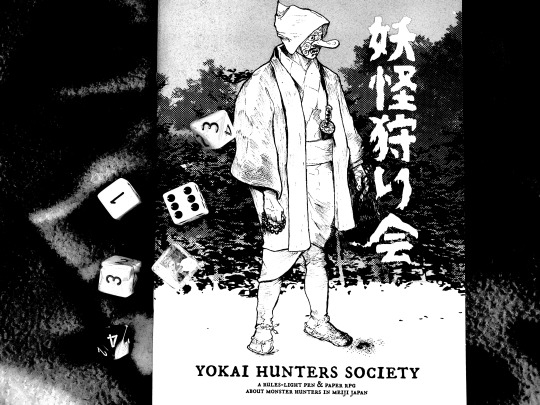
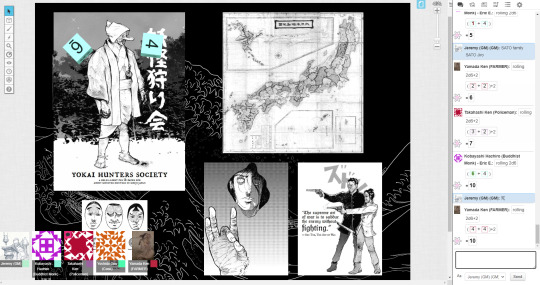

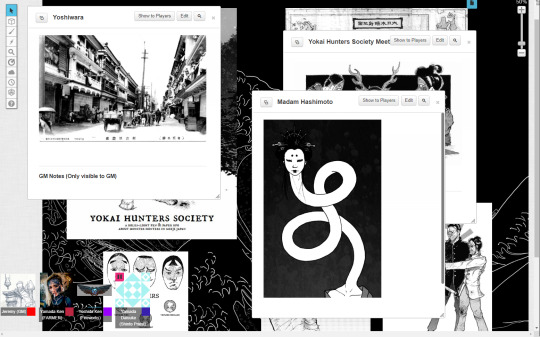

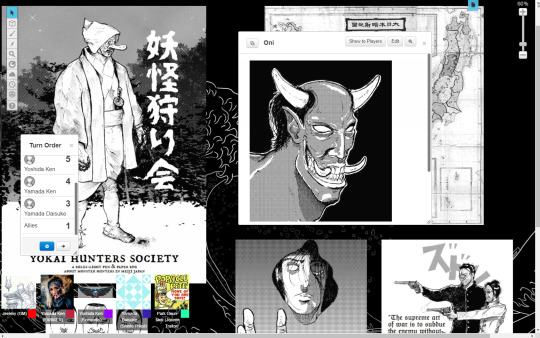
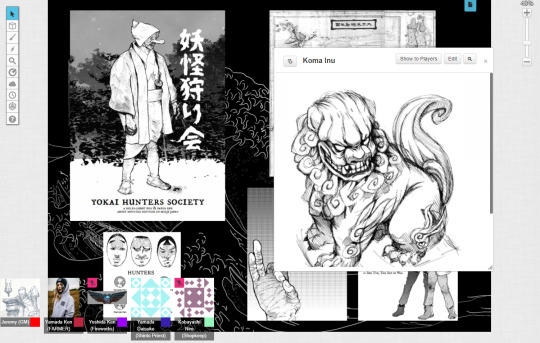
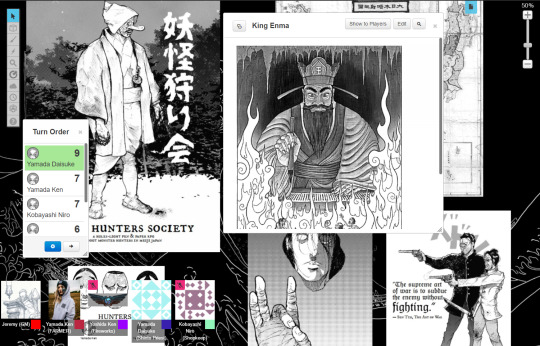

Huntin’ yokai in 1889 Japan
I have been really busy lately. Changes in life and work are in full gear, and after years of doubting myself and making excuses, I’ve finally started freelancing in the gaming space! And for $$$, too! In short, I’ve been writing a ton of articles for D&D Beyond and a few other spots that are still under wraps, and really, I owe it to the good people at Asians Represent for giving me the encouragement I needed to get my name out there. (For those who read my stuff here but don’t follow me on Twitter, check out the massive Legends of the Five Rings readthrough that I did with Asians Rep. I appear in episode 6 onwards! You can also view my occasional appearances on their weekly talk show The Wrap Up.)
Recently, I’ve also made it a point to experiment with more tabletop games that are decidedly not D&D, especially indie stuff. For a while I’ve wanted to write about Yokai Hunters Society, a sweet game that I snagged during last year’s itch.io racial justice bundle. Made by one dude living in Taiwan (as a half-Taiwanese, you know I need to support this man), Yokai Hunters Society tasks players with becoming mask-wearing monster hunters, and it’s set during the late 1880s, when Japan was opening up to the rest of the world and on a heavy-duty industrialization kick. Not quite a empire obsessed with colonizing East Asia but no longer a secluded island nation, Japan experienced many reports of yokai sightings during this time, perhaps because as the nation modernized and clashed with tradition, the old school threat of ghosts lurking in the shadows reared its head. It’s a great time period, and frankly I find this history more interesting than the usual fetishization of samurai culture that you see in modern media. (Once again, watch those Legends of the Five Rings videos I linked above for my thoughts on samurai and all that jazz.)
The system itself plays similar to Powered by the Apocalypse, with swingy rolls of 2d6 determining most outcomes. On a roll of 10 or above, you succeed, on a 9 you succeed but suffer a consequence, and on an 8 or less, you fail and the situation escalates. There’s no need for the Game Master to ever roll dice, and the rules-light feel of the system lends itself to highly narrative, fast-paced gameplay.
Thus far, I’ve written and run a trilogy of adventures using this system, all of which I ran on Roll20 with a black and white aesthetic (I was trying to emulate World of Horror) and a bumpin’ playlist of Sega Genesis chiptune music (I used Revenge of Shinobi extensively.) All the adventures were centered around yokai affected by the burgeoning technology and civil changes of the era.
The first campaign, which I dubbed “Tragedy of the River Children,” was about a group of hunters venturing to a rice paddy village where farmers had forged a pact with kappa to irrigate their fields. In return, the kappa would be provided with food (cucumbers!) as well as the opportunity to mate with certain villagers and ensure the survival of their species via kappa-human hybrids. Unfortunately, modernization had brought in new irrigation machines that could render the pact obsolete, and a villager had turned up dead with all signs pointing to a kappa as the culprit. The game took on a very environmentalism-heavy feel when we played, and I was careful to keep us from veering into H.P. Lovecraft territory - specifically his story The Shadow Over Innsmouth, which clearly has the subtext of “interracial sexual relations are bad.”
For my next campaign, “The Long-Necked Ladies of Yoshiwara,” I wanted to continue looking at these themes in the most famous red-light district of Japan’s past - Yoshiwara, basically a mini-city within Tokyo. I did a lot of research into Yoshiwara’s history and devised a plot where a oiran (basically a high-ranking courtesan) revealed herself to the players as a rokurokubi, a stretchy-necked female yokai. She employed the party to investigate a rival brothel that had entrapped another rokurokubi and was secretly run by an oni, who was using a drug to disguise himself as a human and planned to ally with gangsters and take over Tokyo’s underworld. Once again, the goal here was to investigate how yokai had adapted to a changing world, specifically the red-light floating world. Why wouldn’t an enterprising oni with a fancy suit and the means of masquerading as a human take advantage of the new business opportunities that emerged during turn-of-the-century Japan, after all?
Finally, the most recent campaign that I just finished, “The Monsters of Mt. Mitake,” was a direct continuation that had players journeying to the mountain village of the brothel-running oni and destroying the drugs that he and his compatriots had used to disguise themselves as humans. This one was probably the most combat-heavy and least introspective adventure of the lot, but there were a ton of memorable moments, like a scene where the party entered a small mountain inn and were confronted by dozens of distrusting stares - all from people who could have been oni in disguse! (Turns out, there were only a handful of oni and kotengu in the village that were harvesting the drugs, and they’d enslaved the rest of the populace. Still suspenseful as heck, though.)
All in all, as someone who’s long enjoyed the nuances of late 19th-century Japanese history as well as stories that deal with how monsters and humans interact with each other, I’ve gotten quite a kick out of Yokai Hunters Society. Currently I’m putting the system aside for a bit to explore other indie RPGs, but I do have an idea percolating in the back of my mind for a future campaign involving Japan’s burgeoning railway system... Maybe something like The Last Express, but with yokai? If I ever end up running this, best believe that I’ll find time to write about it here!
17 notes
·
View notes
Note
what are some roles that have been largely changed for cityrune? since you said queen was an influencer now :]
hi ty for asking me im vibrating. havent gotten to talk about this au now for three years and now that chapter 2 is like real and this time i can like........draw occasionally and i have more understanding of nuance...... [grips table] [screams]
this isnt quite what you asked but heres what's everyone from chapter 1 has been Up To with a little bit of context (and under a read more bc it got LENGTHY):
kris - professional stay at home teen (they live w/ asgore n help run the flower shop sometimes. this decision was entirely bc i dont like toriel). was wrongly diagnosed w Sudden Soul Rejection when they were incredibly young and given an experimental transplanted soul as a replacement. it works for them fine, give or take having to see gaster once a month for checkups. but sometimes the soul makes them skittish n decides they're going to sit in front of the pc and play 30 consecutive hours of a certain simulation game and not even let them drown people in the pool. if it were entirely up to them, they'd be like. passing out on the sofa to documentaries about bigfoot. or practicing cool knife tricks to impress their friends at their next tabletop meetup
- EDITED IN: the soul is kind of their friend. they are wearing a hypothetical get along shirt. most of the time, they agree on actions and things to do. tends to refer to themself + their soul as we/us which originally was just something they did in their head but they kept slipping in speech/text n just became a Thing of how they talk. switches to 'I/Me' whenever smth is wrong.
- also edited in: they believe the soul they have is their original soul bc nobody has told them otherwise. whenever theyre like 'oh yeah we think about our soul n view it as a separate entity to us like. all the time. it likes to hurt if we make too many choices it doesn't seem to like and kind of forces us to be a toned down version of what we want to be but thats just how souls are haha' and everyone is like.... 'Hey Kris That's Really Not How It Is.' theyre like. 'huh. gonna ignore that for now' - this was going to be a plot point
toriel - head of H0MEWOR1D (H01)'s department of education; kind of lost her roots as a simple math teacher as she was pushed into a lot of power she didn't even really seek out. divorced asgore over some miscommunications in their relationship; also loosely as a result of grief from asriel's death
asgore - the same. runs a lil flower/gift shop. people come in more to talk with him than to buy flowers most of the time, though
asriel Flowey - he's back in flower form, thanks to the government an accident. causes a lot of technology glitches wherever he goes, and wants revenge. isn't sure how to go about it. asriel "died" around 8 years before the story takes place and kris still misses him and refuses to even THINK about even the IDEA of calling someone their sibling after what happened, just in case it somehow happens a second time
susie - more of the same really. she spends most of her time either at grillby's (she's sort of become his assistant n helps with opening/closing. it just happened) or getting into low-stakes trouble w/ kris
noelle - she's in the city's equivalent of college and shes so tired. shes So Abysmally Tired n got kinda pushed 2 follow in her mom's footsteps. she's rarely around anymore except through text or on monsters & mages (dnd) night. (however.........she will come back w/ a long break n hang out w everyone again)
berdly - tbh i didnt even consider berdly when i made the au initially. idk what he's doing. probably in a similar situation to noelle??? canonically got kicked out of the M&M group due to clashes w/ other players but lurks in their group chat to posts memes sometimes
didnt rly think of any other of kris' classmates (+ their families) after ch1 and probably will continue to not, until chs 3-5 come out and i gotta whip up roles and histories for like. a lotta guys all of a sudden. i also forgot about noelle's parents
sans - runs a convenience store that everyone kind of thinks is a front, but also it has really cheap snacks and the local teens make a point of stopping there after school. so essentially, more of the same papyrus - similar to ut. is a very polite and sweet boy but you'll know when he's coming
grillby - he's back. he runs a bar like back in ut but the cozy vibes and weird-for-a-bar hours keep attracting kids who need parents, so half of his menu is comprised of overly sweet mocktails. usually only frequented by monsters
QC - same as usual. has a "rivalry" with grillbz but, theyre besties and have a book club
mettaton - he's real and he's back. he's similar to how he is back in ut w/ his EX body. likes to hang out at grillby's and talk to unsuspecting fans. has a show for everything
napstablook - similar to how they are in ut. helps mtt with making music sometimes. doesn't leave the house too often, but spends a lot of time posting on undernet
undyne - unfortunately. more of the same. she is a cop in the monster district. i am also upset by this but couldn't think of anything better for her
alphys - a doctor studying under dr. gaster in the hopes she'll one day take over his research. she spends most of her time as a nurse with a bigger title, though, and blocks out the weirdness of her job with anime.
gaster - weird guy. H01's top soul researcher and resident House wannabe. trying to manufacture the ultimate soul that can be controlled with simple internal switches, but so far he's only had 1 (very limited) success with a certain human. monsters just melt, and darkners just sorta......get weird... he's onto Something, though.
ralsei - lonely boy with some very strange hobbies. popular on UnderNet for poetry, baking videos, and general cryptid vibe. is the DM for the monsters & mages group (also seems to think everything is actually very fine in H01 when it is very much not)
lancer - about the same. professional Round Boy. lives w/ rouxls full time. follows susie around like a lost puppy and calls himself her "underling."
rouxls - runs a hotel/casino kind of deal where the objective Bad Guys hang out, and usually ends up doing any of the spade king's paperwork.
spade king - mafia godfather. kind of a dick. don't play cards with him
seam - works with the spade king as his right hand cat more or less because they have for a lot of years and are in that 'sunk cost fallacy' zone. thinks of retiring to a quiet life in the monster section of town like, daily
jevil - used to work with the spade king, but got imprisoned for Crimes. got weird after The Accident (separate from asriel's accident)
temmies (all) - dont really get mentioned except offhandedly but they run the monster space station. so far, are the only monsters who have ever been to space.
as far as chapter 2 goes:
yeah i dont have much so far for characters. in the original version of the au i accidentally made darkners as a whole just kinda..... not great? like all sorts of weird organized crime ties n sort of going out of their way to be A Problem to the city (not even in like. a revolution way. in a working against them but with the same goals kinda way). with the whole context it worked At The Time, bc i just had the spade king to look to as a villain, and also in this au the darkners are just trying to survive a world that ultimately was not built for them (that humans think they own, and monsters sort of... seeing this and wondering what it'll mean for them whichever one wins), but w/ new info abt how the dark world works n more guys to work with i want to kind of. edit the vibe a bit. like yea darkners will ultimately do whatever it takes to take over H01, but maybe in a better way than like. idk. all this. it doesnt have to be peaceful or anything it just has to be more adaptable as we meet more kinds of darkners
however yeah i thought up 'queen as some sort of childless mommy blogger/influencer' and that completely revived all memory i had of this au. she should be on mtt's talkshow. also she sells collectible wine glasses w/ her likeness
spamton is another one of gaster's failed soul experiments, but he hasn't melted yet, and seems............fine? sort of. so he hasn't gotten decommissioned yet. he does want to give you malware tho. hot monster singles in your area n all that
im blanking on the rest of the guys but i hope any of this was comprehensible
2 notes
·
View notes